Bachelor's Degree in Computer Engineering
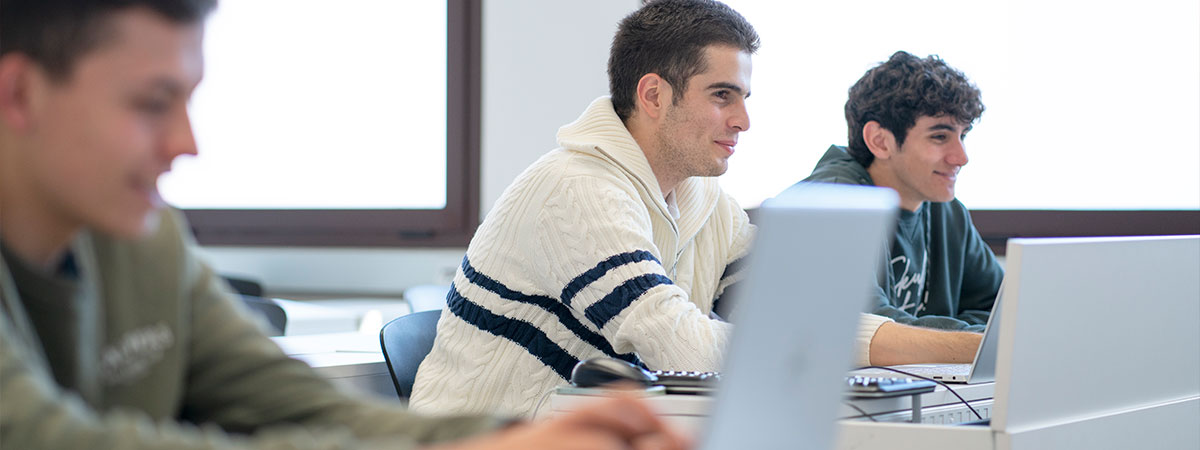
The Bachelor's Degree in Computer Engineering at Nebrija University offers a cutting-edge education, supported by industry leaders such as Telefónica, Indra, BQ Educación and Atos
The Bachelor's Degree in Computer Engineering at Nebrija University offers state-of-the-art education, endorsed by industry frontrunners and renowned experts. Developed in collaboration with leading companies like Telefónica, Indra, BQ Educación, and Atos, our program stands out for its innovative curriculum, blending three years of academic training with a year-long internship.
Our faculty comprises professionals with a robust business background and educators associated with the esteemed ARIES research center in Artificial Intelligence and Emerging Systems. This blend ensures students receive top-tier training, accessing cutting-edge content that remains highly pertinent in the ever-evolving realm of Computer Engineering—both today and tomorrow.
Our Doctorate program in Industrial Technologies and Computing at Nebrija University thrives on close collaboration with a distinguished research group. Faculty members actively contribute to the ARIES Center (Artificial Intelligence and Emergent Systems), specializing in teaching and research within Artificial Intelligence and Applied Data Science. This enables the resolution of pertinent industry and research challenges across various sectors such as Bioengineering, Materials Engineering, and Aerospace Engineering through cutting-edge technological solutions.
Read +Furthermore, we actively engage in research ventures concerning new space technologies in partnership with the European Space Agency. Additionally, our involvement in Bioengineering applications includes collaborations with CSIC and the Technische Universität of Dresden.
Our program extends internship agreements with prominent companies and institutions in the ICT sector. Collaborations include leading entities like ACCENTURE, ATOS, BANCO SANTANDER, BBVA, BANKINTER, CAPGEMINI, INDRA, KPMG, MINISTRY OF DEFENSE, ORANGE, PwC, REPSOL, and TELEFONICA, providing students with invaluable opportunities for hands-on experience in authentic work environments.
The internship process is meticulously overseen, managed by a coordinator and internship tutors overseeing small student groups. This meticulous approach reflects in an almost 100% pass rate among graduates and exceptionally high student satisfaction. This success underscores the effectiveness of our practical business subjects and the final research project.
Read LessNebrija University is committed to advancing the field of quantum computing as a pivotal scientific and technical discipline, fostering growth and competitiveness among companies and institutions. In support of this, we proudly host the Nebrija Quantum Connection conference, an event that unites various stakeholders in the realm of Quantum Computing in Spain.
Undergraduate profile:Young people who like to create. Those who know that computer science provides the means to build new realities, systems and applications and who want to take advantage of Nebrija University’s extensive experience in providing IT Engineering degrees to program their future.
Graduate profile:The profile of the graduate is a person who can:
- Exercise the profession, with a clear awareness of its human, economic, social, legal and ethical sides.
- Take responsibility for organisations, both technical content and management (supervised), and contribute towards information management and knowledge management, with initiative and entrepreneurship.
- Develop aspects related to the professional practice of Engineering: directing projects; solving problems in their professional field; communicating clearly and effectively; working in multilingual and multidisciplinary teams; adapting to changes and learning autonomously throughout life; managing key concepts, techniques and tools related to the field of Computer Engineering; effectively learning and using techniques and tools that emerge in the future innovating (this versatility makes them particularly valuable in organisations in which permanent innovation is required); applying analysis and summarising, organisational and planning skills; specifying, designing, building, implementing and maintaining, as well as verifying, auditing and assessing computer systems that meet the needs of their users; with sufficient training to be able to continue with Master’s or Ph.D studies either at home or abroad to complete their management skills and their specialisation
Official qualification:Bachelor's Degree in Computer Engineering
Center responsible:Higher Polytechnic School
Branch of knowledge:Engineering and Architecture
Available places:90
Total Credits 240 credits.
Minimum 12 ECTS and maximum 90 ECTS per registration and academic period
Year of degree course foundation: 2017 – 2018
Languages: This degree course is taught in Spain
Type of education: Classroom Attendance
Academic regulations: General student’s regulations. Credit transfer and recognition. Regulation of student participation. Common procedures for carrying out the Final Research Project
University Services: [+info]
Internal Quality Assurance System System managers Incidents, Suggestions and Complaints Job placement report and assessment of training received
Fully equipped facilities for highly practical training
Curriculum
BOE No.167, of July 11, 2018
All our degrees and curricula have been prepared in accordance with the new guidelines set by current legislation, having already been verified by the National Agency for Quality Assessment.
The student must complete 240 credits
First year 60 ECTS
First Semester 30 ECTS- 6 ECTS | Physics Applied to Information Technology
- 6 ECTS | Mathematics I
- 6 ECTS | Mathematics II
- 6 ECTS | Programming I
- 6 ECTS | Skills Development I
Second Semester 30 ECTS- 6 ECTS | Digital Systems
- 6 ECTS | Data Structures and Algorithms
- 6 ECTS | Mathematics Extension
- 6 ECTS | Programming II
- 6 ECTS | Business and its Environment
Second year 60 ECTS
First Semester 30 ECTS- 6 ECTS | Statistics
- 6 ECTS | Computer Technology
- 6 ECTS | Language Processors
- 6 ECTS | Advanced Programming Techniques
- 6 ECTS | Technology Entrepreneurship
- 6 ECTS | Development of Interpersonal Involvement and Solidarity
Second Semester 30 ECTS- 6 ECTS | Software Engineering
- 6 ECTS | Databases
- 6 ECTS | Computer Structure
- 6 ECTS | Computer Networks
- 6 ECTS | Skills Development II
Third year 60 ECTS
First Semester 30 ECTS- 6 ECTS | Operating Systems
- 6 ECTS | Computer Architecture
- 6 ECTS | Embedded Real-Time Systems
- 6 ECTS | Technology Project Management
- 6 ECTS | Architecture and Programming of Systems on the Internet
Second Semester ECTS- 6 ECTS | Web Interface Programming
- 6 ECTS | Distributed System Programming
- 6 ECTS | Real Time Fault Tolerant Systems
- 6 ECTS | Automatic System Design
- 6 ECTS | Artificial intelligence
Fourth year 60 ECTS
First Semester 30 ECTS- 30 ECTS | Assessment of business skills I: Internship
Second Semestrer 30 ECTS- 18 ECTS | Assessment of business skills II: Internship
- 12 ECTS | Final Research Project
More information about this subjects
- 6 ECTS | Skills Development I
- 6 ECTS | Skills Development II
Up to 6 credits will be recognised on the basis of the activities carried out by the student throughout his or her degree course. Credits will be awarded for cultural, sports, student representation, solidarity and cooperation activities.
The aim of this programme is to support students' on-the-job training under the ongoing supervision of the University's Professional Careers Department, the academic department responsible for awarding the degree, and the partner company or institution where the internship takes place. You will be advised on how best to choose your internship, and will be monitored and tutored on an ongoing basis, with a view to your own professional interests.
External practices: collaborating entities Procedure of action in the realization of External Internships Management process for external internships and Professional Guidance Protocol for the management of business practices More Information on Internships in CompaniesThe Final Research Project is an academic dissertation on a topic within the curriculum, which is assessed with a view to the skills acquired throughout the Bachelor's degree programme. The project can be related to an internship or form part of a research effort.
Through the transversal subjects you will be able to complement your education and complete your CV in a practical, collaborative and fun way.
It is a voluntary program with no added cost. Upon completion, you will be provided with a diploma.
Access all the informationNebrija University, which is committed to languages and quality, provides the student with added value with the Diploma in English Professional Communication, which will allow him/her to achieve with confidence the competence demanded to successfully join the labor market.
It corresponds to level C1.
More information herePrevious curriculum (to extinguish)
First year 60 ECTS
First Semester 30 ECTS- 6 ECTS | Physics Applied to Information Technology
- 6 ECTS | Mathematics I
- 6 ECTS | Mathematics II
- 6 ECTS | Programming I
- 6 ECTS | Skills Development I
Second Semester 30 ECTS- 6 ECTS | Digital Systems
- 6 ECTS | Data Structures and Algorithms
- 6 ECTS | Mathematics Extension
- 6 ECTS | Programming II
- 6 ECTS | Business and its Environment
Second year 60 ECTS
First Semester 30 ECTS- 6 ECTS | Statistics
- 6 ECTS | Computer Technology
- 6 ECTS | Language Processors
- 6 ECTS | Advanced Programming Techniques
- 6 ECTS | Technology Entrepreneurship
- 6 ECTS | Development of Interpersonal Involvement and Solidarity
Second Semester 30 ECTS- 6 ECTS | Software Engineering
- 6 ECTS | Databases
- 6 ECTS | Computer Structure
- 6 ECTS | Computer Networks
- 6 ECTS | Artificial intelligence
Third year 60 ECTS
First Semester 30 ECTS- 6 ECTS | Operating Systems
- 6 ECTS | Computer Architecture
- 6 ECTS | Embedded Real-Time Systems
- 6 ECTS | Technology Project Management
- 6 ECTS | Architecture and Programming of Systems on the Internet
Second Semester ECTS- 6 ECTS | Web Interface Programming
- 6 ECTS | Distributed System Programming
- 6 ECTS | Skills Development II
- 6 ECTS | Automatic System Design
- 6 ECTS | Programming systems and devices
Fourth year 60 ECTS
First Semester 30 ECTS- 30 ECTS | Assessment of business skills I: Internship
Second Semester 30 ECTS- 18 ECTS | Assessment of business skills II: Internship
- 12 ECTS | Final Research Project
If you are a Senior Technical Officer in any of these specialties:
- Automation and Industrial Robotics
- Administration of Network Computer Systems
- Development of Multiplatform Applications
- Web applications development
- Electronic Maintenance
And you want to obtain your Bachelor's Degree in Computer Science Engineering, you can do it with us in a practical, personalized, current and innovative program.
Bachelor's Degree in Computer Science Engineering for Senior Technical Officers in...
Administration of Network Computer Systems Automation and Industrial Robotics Development of Multiplatform Applications Web applications development Electronic MaintenanceProfessors
| Profesores Professors | Porcentaje de Doctores Percentage of PhD holders |
| 46 | 50% |
 Jaime Álvarez Benayas
Director del Grado en Ingeniería Informática
Jaime Álvarez Benayas
Director del Grado en Ingeniería Informática Profesor del área de Ingeniería del Software, Sistemas de Información y Sistemas Inteligentes Director of the Bachelor's Degree in Computer Engineering
Professor in the area of Software Engineering, Information Systems and Intelligent Systems Ingeniero Informático y Doctor en Biología Molecular y Bioinformática (2020) por la Universidad de Sheffield en Inglaterra. Ha desarrollado su carrera profesional dentro de la universidad como investigador en cáncer usando técnicas de análisis bioinformático: combinando datos genómicos, transcriptómicos y epigenéticos de pacientes para avanzar el entendimiento de la biología del Mieloma Múltiple, la segunda neoplasia maligna sanguínea más común y actualmente incurable. Adicionalmente, ha impartido docencia en varias universidades españolas dentro del ámbito de ingeniería informática, matemática y biomédica. También ha trabajado en el campo de la consultoría para multinacionales del sector de las TIC, en seguridad informática y Business Intelligence en EY, PwC, Telefónica o Banco Santander. El área principal de interés incluye el uso de la informática y las nuevas tecnologías para la mejora de la vida de las personas, específicamente en el área de la salud y el cáncer.
 Fernando Aguilar Galindo Ávila
Profesor del área de Competencias Profesionales
Professor of Professional Skills area
Fernando es Licenciado en Psicología Clínica por la Universidad de Comillas y posee la Especialidad de Psicología Industrial por la Universidad Complutense, además de ser Especialista en Psicología Aplicada a la Empresa por ICADE.
A lo largo de sus 30 años de experiencia profesional, ha desarrollado puestos de Dirección y Gerencia en Compañías multinacionales como Bossard, Gemini Consulting (Cap Gemini) MCC, Soluziona o Indra.
En la actualidad posee su propia compañía a través de la cual desarrolla Servicios Profesionales en materia de Recursos Humanos y, formando parte del equipo del Instituto Iñaki Piñuel, acciones como Consejo Psicológico, así como Prevención y Gestión de Riesgos Psicosociales.
Fernando Aguilar Galindo Ávila
Profesor del área de Competencias Profesionales
Professor of Professional Skills area
Fernando es Licenciado en Psicología Clínica por la Universidad de Comillas y posee la Especialidad de Psicología Industrial por la Universidad Complutense, además de ser Especialista en Psicología Aplicada a la Empresa por ICADE.
A lo largo de sus 30 años de experiencia profesional, ha desarrollado puestos de Dirección y Gerencia en Compañías multinacionales como Bossard, Gemini Consulting (Cap Gemini) MCC, Soluziona o Indra.
En la actualidad posee su propia compañía a través de la cual desarrolla Servicios Profesionales en materia de Recursos Humanos y, formando parte del equipo del Instituto Iñaki Piñuel, acciones como Consejo Psicológico, así como Prevención y Gestión de Riesgos Psicosociales.
 Óscar Aguado Tevar
Profesor del área de Empresa
Professor of the Business area
Director Gerente de la Universidad Nebrija. Ingeniero de Minas y doctor por la Universidad Politécnica de Madrid, con la tesis “Análisis de la estructura de la oferta/demanda y rentabilidad esperada en el sector de la distribución minorista de carburantes mediante la evaluación de emplazamientos (2016)". Posee además una Licenciatura en Administración y Dirección de Empresas por la Escuela de Negocios HEC-París, y con dos másteres en Economía de la Energía por el Instituto Francés del Petróleo y la Universidad de Oklahoma. Cuenta con una amplia experiencia universitaria. Es docente desde 2016 y adicionalmente a la docencia que imparte actualmente en Nebrija, es responsable de los módulos de Economía en el Master's degree in Oil & Gas Engineering (MIP) y en el Curso de Experto en Ingeniería y Usos del Gas ante la Transición Energética (gasTE) de la ETSI de Minas y Energía (UPM). Ha impartido asignaturas financieras en diversos programas de CUNEF (Máster en Finanzas - MUIMF, Master in International Business and Global Management, Programa Ejecutivo Dirección Financiera, formación in Company…), y ha dirigido una quincena de TFMs. Además de participar en el Gobierno de Nebrija a través de sus diferentes Consejos (Gestión, Gobierno, Dirección... entre otros), ha estado involucrado en Política y Gestión Universitaria, y ha desempeñado varios cargos unipersonales y de representación en órganos colegiados tanto en CUNEF Universidad (miembro de la Comisión de Participación constituyente) como en la UPM (Consejo Social, Claustro, Consejo/Junta de Gobierno, Junta de Escuela...), y participado en paneles de acreditación como ABET o EFMD/ENQHEEI. Anteriormente había trabajado en BBVA, entidad en la que ha desarrollado su carrera durante 16 años: 9 en Estrategia y Desarrollo de Negocio de la división de gestión de activos (AM&GW) y 7 en banca mayorista en el ámbito energético (como analista de bolsa de empresas petroleras, realizando fusiones y adquisiciones, o como analista de riesgos de compañías de hidrocarburos).
Óscar Aguado Tevar
Profesor del área de Empresa
Professor of the Business area
Director Gerente de la Universidad Nebrija. Ingeniero de Minas y doctor por la Universidad Politécnica de Madrid, con la tesis “Análisis de la estructura de la oferta/demanda y rentabilidad esperada en el sector de la distribución minorista de carburantes mediante la evaluación de emplazamientos (2016)". Posee además una Licenciatura en Administración y Dirección de Empresas por la Escuela de Negocios HEC-París, y con dos másteres en Economía de la Energía por el Instituto Francés del Petróleo y la Universidad de Oklahoma. Cuenta con una amplia experiencia universitaria. Es docente desde 2016 y adicionalmente a la docencia que imparte actualmente en Nebrija, es responsable de los módulos de Economía en el Master's degree in Oil & Gas Engineering (MIP) y en el Curso de Experto en Ingeniería y Usos del Gas ante la Transición Energética (gasTE) de la ETSI de Minas y Energía (UPM). Ha impartido asignaturas financieras en diversos programas de CUNEF (Máster en Finanzas - MUIMF, Master in International Business and Global Management, Programa Ejecutivo Dirección Financiera, formación in Company…), y ha dirigido una quincena de TFMs. Además de participar en el Gobierno de Nebrija a través de sus diferentes Consejos (Gestión, Gobierno, Dirección... entre otros), ha estado involucrado en Política y Gestión Universitaria, y ha desempeñado varios cargos unipersonales y de representación en órganos colegiados tanto en CUNEF Universidad (miembro de la Comisión de Participación constituyente) como en la UPM (Consejo Social, Claustro, Consejo/Junta de Gobierno, Junta de Escuela...), y participado en paneles de acreditación como ABET o EFMD/ENQHEEI. Anteriormente había trabajado en BBVA, entidad en la que ha desarrollado su carrera durante 16 años: 9 en Estrategia y Desarrollo de Negocio de la división de gestión de activos (AM&GW) y 7 en banca mayorista en el ámbito energético (como analista de bolsa de empresas petroleras, realizando fusiones y adquisiciones, o como analista de riesgos de compañías de hidrocarburos).
 Alejandro Alonso Puig
Profesor del área de Programación
Professor of the Programming area
Diplomado en Informática por la Universidad Politécnica de Madrid en 1989. Programa Desarrollo Directivo por el IESE (Universidad de Navarra) en 2001. Máster en comunicaciones de datos por el Centro de Alta Formación en Informática (CENEI) en 1992. Tiene la certificación Six Sigma Green Belt en gestión de proyectos y la certificación de Scrum Master en gestión de proyectos. Tiene amplia experiencia en instituciones universitarias como profesor de postgrado en IE Business School (Instituto de Empresa), profesor de máster y grado en la universidad Alfonso X el Sabio. Como profesional tiene más de 30 años de experiencia en los sectores IT, Industria, robótica y drones (Honeywell, IBM, ABB, IXION Industria y Aeroespacio, Infinium Robotics y Quark Robotics, tanto en España como en Singapur)., además de experiencia en emprendimiento. Ha publicado varios libros, entre otros: "Drones profesionales" 2016 (Amazon), "Robotic operation system" 2019 (Amazon) y "Electrónica Analógica y Digital" 2023 (MBS).
Alejandro Alonso Puig
Profesor del área de Programación
Professor of the Programming area
Diplomado en Informática por la Universidad Politécnica de Madrid en 1989. Programa Desarrollo Directivo por el IESE (Universidad de Navarra) en 2001. Máster en comunicaciones de datos por el Centro de Alta Formación en Informática (CENEI) en 1992. Tiene la certificación Six Sigma Green Belt en gestión de proyectos y la certificación de Scrum Master en gestión de proyectos. Tiene amplia experiencia en instituciones universitarias como profesor de postgrado en IE Business School (Instituto de Empresa), profesor de máster y grado en la universidad Alfonso X el Sabio. Como profesional tiene más de 30 años de experiencia en los sectores IT, Industria, robótica y drones (Honeywell, IBM, ABB, IXION Industria y Aeroespacio, Infinium Robotics y Quark Robotics, tanto en España como en Singapur)., además de experiencia en emprendimiento. Ha publicado varios libros, entre otros: "Drones profesionales" 2016 (Amazon), "Robotic operation system" 2019 (Amazon) y "Electrónica Analógica y Digital" 2023 (MBS).
 Juan Antonio Andrés Sáez
Profesor del área de Ingeniería de Computadores
Professor of the Computer Engineering area
Ingeniero en Informática con Máster Oficial por la Universidad Autónoma de Madrid (UAM). Es Experto en Docencia Universitaria por la UAM desde 2014. Actualmente es investigador del grupo HCTLab en la UAM donde está finalizando su tesis basada en arquitecturas híbridas. Desarrolla su actividad principal como Ingeniero Senior en RF Española, empresa que diseña y desarrolla productos de comunicaciones tácticas para Defensa, y donde es experto en diseño electrónico y firmware en tiempo real. En paralelo desarrolla su actividad como Profesor Asociado del Dpto. de Tecnología Electrónica y de las Comunicaciones de la UAM desde 2002. En el pasado fue CTO de Arthika Trading Solutions e Ingeniero Senior en empresas como Indra, Telefónica o SIDSA, donde desarrolló labores de diseño electrónico y de sistemas.
Juan Antonio Andrés Sáez
Profesor del área de Ingeniería de Computadores
Professor of the Computer Engineering area
Ingeniero en Informática con Máster Oficial por la Universidad Autónoma de Madrid (UAM). Es Experto en Docencia Universitaria por la UAM desde 2014. Actualmente es investigador del grupo HCTLab en la UAM donde está finalizando su tesis basada en arquitecturas híbridas. Desarrolla su actividad principal como Ingeniero Senior en RF Española, empresa que diseña y desarrolla productos de comunicaciones tácticas para Defensa, y donde es experto en diseño electrónico y firmware en tiempo real. En paralelo desarrolla su actividad como Profesor Asociado del Dpto. de Tecnología Electrónica y de las Comunicaciones de la UAM desde 2002. En el pasado fue CTO de Arthika Trading Solutions e Ingeniero Senior en empresas como Indra, Telefónica o SIDSA, donde desarrolló labores de diseño electrónico y de sistemas.
 Ignacio Aznárez Ramos
Profesor del área de Ingeniería de Computadores
Professor of the Computer Engineering area
Graduado en ingeniería de telecomunicaciones por la Universidad Politécnica de Madrid (UPM). Desde septiembre del 2023 es investigador del proyecto Sky IA connect - Capgemini con zcu208 RFSoC. Anteriormente, fue responsable técnico del proyecto de verificación FPGA: Airbus CRISA en representación de Capgemini, trabajando directamente con el cliente para realizar la verificación de la FPGA de un proyecto espacial utilizando la metodología Airbus y el estándar de seguridad espacial. También participó en la investigación técnica dentro del Grupo I2A2 de la UPM para el proyecto ITER para sistema de control Interlock. Realiza la verificación y validación del Sistema de Control Fast Interlock mediante lenguajes de descripción y verificación de hardware (SV). Maneja hardware de instrumentación avanzada de adquisición de datos (CompactRio y Labview para FPGAs). Todo ello, le permitió adquirir habilidades dentro de un entorno profesional competitivo en un proyecto internacional. Sus inicios fueron en Indra sistemas, dentro del Departamento de Defensa y Transportes. Su actividad profesional fue la verificación y simulación de los códigos VHDL del Sistema D-VOR, para su posterior documentación, así como la búsqueda y solución de errores en los mismos. Realizó de pruebas de integración y estabilidad del Sistema D-VOR en laboratorio.
Ignacio Aznárez Ramos
Profesor del área de Ingeniería de Computadores
Professor of the Computer Engineering area
Graduado en ingeniería de telecomunicaciones por la Universidad Politécnica de Madrid (UPM). Desde septiembre del 2023 es investigador del proyecto Sky IA connect - Capgemini con zcu208 RFSoC. Anteriormente, fue responsable técnico del proyecto de verificación FPGA: Airbus CRISA en representación de Capgemini, trabajando directamente con el cliente para realizar la verificación de la FPGA de un proyecto espacial utilizando la metodología Airbus y el estándar de seguridad espacial. También participó en la investigación técnica dentro del Grupo I2A2 de la UPM para el proyecto ITER para sistema de control Interlock. Realiza la verificación y validación del Sistema de Control Fast Interlock mediante lenguajes de descripción y verificación de hardware (SV). Maneja hardware de instrumentación avanzada de adquisición de datos (CompactRio y Labview para FPGAs). Todo ello, le permitió adquirir habilidades dentro de un entorno profesional competitivo en un proyecto internacional. Sus inicios fueron en Indra sistemas, dentro del Departamento de Defensa y Transportes. Su actividad profesional fue la verificación y simulación de los códigos VHDL del Sistema D-VOR, para su posterior documentación, así como la búsqueda y solución de errores en los mismos. Realizó de pruebas de integración y estabilidad del Sistema D-VOR en laboratorio.
 Andrés Bravo Montes
Profesor del área de Sistemas Operativos, Sistemas Distribuidos y Redes
Professor of the area of Operating Systems, Distributed Systems and Networks
Ingeniero Informático y McS en Computación Cuántica por la Universidad Antonio de Nebrija, doctorando en Computación Cuántica por la UCM. Mis líneas de investigación de grado y postgrado se enfocan en la corrección de errores para procesadores cuánticos. Actualmente, estudio la resolución de problemas de optimización a través de algoritmos cuánticos con Quantum Annealing.
Trabajo en ATOS IT Solutions and Services Iberia, en la división HPC & Quantum en el cargo de Quantum Engineer. Desempeño funciones en las áreas de negocio y desarrollo técnico del simulador cuántico Atos QLM, para clientes a nivel nacional e internacional en el ámbito europeo.
Andrés Bravo Montes
Profesor del área de Sistemas Operativos, Sistemas Distribuidos y Redes
Professor of the area of Operating Systems, Distributed Systems and Networks
Ingeniero Informático y McS en Computación Cuántica por la Universidad Antonio de Nebrija, doctorando en Computación Cuántica por la UCM. Mis líneas de investigación de grado y postgrado se enfocan en la corrección de errores para procesadores cuánticos. Actualmente, estudio la resolución de problemas de optimización a través de algoritmos cuánticos con Quantum Annealing.
Trabajo en ATOS IT Solutions and Services Iberia, en la división HPC & Quantum en el cargo de Quantum Engineer. Desempeño funciones en las áreas de negocio y desarrollo técnico del simulador cuántico Atos QLM, para clientes a nivel nacional e internacional en el ámbito europeo.
 Virginia Cabrera Álvarez
Profesora del área de Ingeniería de Computadores
Professor of the Computer Engineering area
Graduada en Ingeniería Industrial por la Universidad Rey Juan Carlos. Su trayectoria profesional se centra en el desarrollo de proyectos de ingeniería electrónica de comunicaciones y de control en VHDL sobre dispositivos FPGA para el sector espacio y defensa, además de pruebas de test de verificación y validación de FPGAs de vuelo en Hardware. Actualmente desempeña su actividad profesional como Ingeniera Senior de Firmware en Thales Alenia Space.
Virginia Cabrera Álvarez
Profesora del área de Ingeniería de Computadores
Professor of the Computer Engineering area
Graduada en Ingeniería Industrial por la Universidad Rey Juan Carlos. Su trayectoria profesional se centra en el desarrollo de proyectos de ingeniería electrónica de comunicaciones y de control en VHDL sobre dispositivos FPGA para el sector espacio y defensa, además de pruebas de test de verificación y validación de FPGAs de vuelo en Hardware. Actualmente desempeña su actividad profesional como Ingeniera Senior de Firmware en Thales Alenia Space.
 Carlos Castellanos Manzaneque
Profesor del área de contenidos generales de la ingeniería y empresa
Professor of the general content area of engineering and business
Graduado en Informática por la Universidad Politécnica de Madrid. desarrollador Ruby on Rails y responsable de evolutivos del ERP corporativo en OpenSistemas desde diciembre de 2016. experiencia como desarrollador y diseñador de plataformas y cursos E-Learning en empresas como Bizpills y Accenture. Actualmente, adicional al trabajo estoy embarcado en el desarrollo de un SaaS para la gestión y administración de canales (podcasts, videos, posts...) y aprendiendo sobre No-Code y blockchain.
Carlos Castellanos Manzaneque
Profesor del área de contenidos generales de la ingeniería y empresa
Professor of the general content area of engineering and business
Graduado en Informática por la Universidad Politécnica de Madrid. desarrollador Ruby on Rails y responsable de evolutivos del ERP corporativo en OpenSistemas desde diciembre de 2016. experiencia como desarrollador y diseñador de plataformas y cursos E-Learning en empresas como Bizpills y Accenture. Actualmente, adicional al trabajo estoy embarcado en el desarrollo de un SaaS para la gestión y administración de canales (podcasts, videos, posts...) y aprendiendo sobre No-Code y blockchain.
 Gerardo Conejero Ortega
Coordinador del área de Energía
Gerardo Conejero Ortega
Coordinador del área de EnergíaProfesor del área de Fundamentos de la Física Coordinator of the Energy area
Professor of the Fundamentals of Physics area Doctor en Diseño Industrial por la Universidad Antonio de Nebrija. Ingeniero de Materiales por la Universidad Complutense de Madrid. Profesor asociado en la Universidad Nebrija desde el año 2005 en diversas asignaturas, tanto en su parte teórica como práctica. Ha compaginado su labor docente con labores de investigación y publicaciones en el campo de los materiales (aleaciones de aceros de conformado enriquecidos con nitruros de Nb), en la Universidad Nebrija y con el CENIM. Actualmente se encuentra iniciando temas de investigación en el campo de la dinámica de sistemas para autoconsumo de energías renovables y para aplicaciones didácticas.
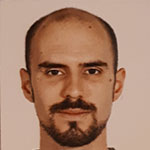 Carlos Javier Correa Oliva
Profesor del área de ingeniería de computadores
Computer engineering professor
Graduado en Ingeniería Industrial por la Universidad Politécnica de Madrid y Máster en Ingeniería Industrial por la misma universidad. Su trayectoria profesional se centra el desarrollo de proyectos de ingeniería electrónica de comunicaciones y de control sobre dispositivos FPGA para los sectores de defensa y espacio. Otros intereses radican en las técnicas de endurecimiento y robustez necesarias para el correcto funcionamiento de la electrónica embarcada en satélites y dispositivos de vuelo. Actualmente desempeña su actividad profesional como ingeniero de microelectrónica en Capgemini Engineering.
Carlos Javier Correa Oliva
Profesor del área de ingeniería de computadores
Computer engineering professor
Graduado en Ingeniería Industrial por la Universidad Politécnica de Madrid y Máster en Ingeniería Industrial por la misma universidad. Su trayectoria profesional se centra el desarrollo de proyectos de ingeniería electrónica de comunicaciones y de control sobre dispositivos FPGA para los sectores de defensa y espacio. Otros intereses radican en las técnicas de endurecimiento y robustez necesarias para el correcto funcionamiento de la electrónica embarcada en satélites y dispositivos de vuelo. Actualmente desempeña su actividad profesional como ingeniero de microelectrónica en Capgemini Engineering.
 Nieves Cubo Mateo
IP del grupo de investigación Nebrija Inteligencia artificial y sistemas emergentes
Nieves Cubo Mateo
IP del grupo de investigación Nebrija Inteligencia artificial y sistemas emergentesProfesora del área de ingeniería del software, sistemas de información y sistemas inteligentes IP of the Nebrija research group Artificial intelligence and emerging systems
Professor in the area of software engineering, information systems and intelligent systems Pionera en la Impresión 3D de tejidos humanos. Doctora en Farmacia por la Universidad Complutense de Madrid, e Ingeniería en Electrónica Industrial y Automática por la Universidad Carlos III de Madrid, donde también obtuvo el título de Máster en Ciencia e Ingeniería de Materiales. Evaluada positivamente por la ANECA en la categoría de Ayudante Doctor, Contratado Doctor y Profesora de Universidad Privada. Ha impartido docencia en la Universidad Internacional de Valencia, en el Grado de Informática (2021-2022) y en el Máster de Bioingeniería (2019-2022). También ha dado clase en la Escuela de Diseño Mecánico (EDDM) en el Máster de Fabricación Aditiva (MIFA) y en curso experto en impresión 3D Biomédico. Actualmente es profesora en el Grado en Ingeniería Informática. A nivel de investigación, ha publicado trabajos científicos dentro del área de la Bioingeniería en diferentes revistas internacionales (primer cuartil). Ha impartido conferencias en congresos internacionales y realizado estancias en el extranjero (Dresden, Alemania). Ha participado en varios proyectos de investigación (Plan Nacional de I+D+i , empresa privada e internacionales) y colabora con investigadores de la UCM, CSIC y la Technische Universität Dresden. Su investigación se centra en modelos y soluciones computacionales dentro del ámbito de la Bioingeniería y del Espacio, donde colabora con la Agencia Espacial Europea.
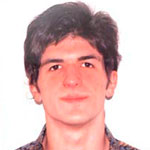 Javier Yebel De Blas Fernández
Profesor del área de Programación
Professor of the Programming area
Ingeniero Informático por la Universidad Antonio de Nebrija. Realizó su TFG sobre la generación de páginas web reactivas mediante interfaces gráficas, creando una aplicación actualmente en uso por Bq educación. Dentro de Bq educación ha participado en otros proyectos como Digicraft y Scoala para la fundación Vodafone. Actualmente es desarrollador móvil en Smartick, habiendo creado una versión de su aplicación totalmente renovada para todo tipo de dispositivos. Es profesor asociado en la Escuela Politécnica Superior de la Universidad Nebrija. Además, fuera del ámbito de la informática imparte seminarios de procesos fotográficos tradicionales.
Javier Yebel De Blas Fernández
Profesor del área de Programación
Professor of the Programming area
Ingeniero Informático por la Universidad Antonio de Nebrija. Realizó su TFG sobre la generación de páginas web reactivas mediante interfaces gráficas, creando una aplicación actualmente en uso por Bq educación. Dentro de Bq educación ha participado en otros proyectos como Digicraft y Scoala para la fundación Vodafone. Actualmente es desarrollador móvil en Smartick, habiendo creado una versión de su aplicación totalmente renovada para todo tipo de dispositivos. Es profesor asociado en la Escuela Politécnica Superior de la Universidad Nebrija. Además, fuera del ámbito de la informática imparte seminarios de procesos fotográficos tradicionales.
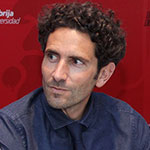 David de la Fuente Franco
Profesor del área de Desarrollo del espíritu participativo y solidario
Professor of the area of Development of the participative and supportive spirit
Graduado en Educación Física por la Universidad Complutense de Madrid y Máster Universitario en Gestión Deportiva por la Universidad de Valencia. Está cursando el doctorado y su ámbito de investigación son las Empresas Saludables. Su trayectoria ha estado siempre ligada al mundo del deporte; en un primer momento en el ámbito escolar, pasando por la gestión municipal de instalaciones deportivas y acabando en la educación superior universitaria. Es director del Servicio de Deportes, Clubes y Bienestar de la Universidad Nebrija (Madrid) desde 2005, miembro permanente del Comité Madrileño de Deporte Universitario (COMADU) y del Comité Español de Deporte Universitario (CEDU), así como Asesor Técnico de diferentes modalidades deportivas para el Observatorio de Deporte Universitario de la Comunidad de Madrid. Forma parte del Comité Organizador de los Campeonatos Universitarios de la Comunidad de Madrid y de los Campeonatos Universitarios de España. Dirige el Programa Saludable de Actividad Física y Deporte para empleados de la Universidad Nebrija.
David de la Fuente Franco
Profesor del área de Desarrollo del espíritu participativo y solidario
Professor of the area of Development of the participative and supportive spirit
Graduado en Educación Física por la Universidad Complutense de Madrid y Máster Universitario en Gestión Deportiva por la Universidad de Valencia. Está cursando el doctorado y su ámbito de investigación son las Empresas Saludables. Su trayectoria ha estado siempre ligada al mundo del deporte; en un primer momento en el ámbito escolar, pasando por la gestión municipal de instalaciones deportivas y acabando en la educación superior universitaria. Es director del Servicio de Deportes, Clubes y Bienestar de la Universidad Nebrija (Madrid) desde 2005, miembro permanente del Comité Madrileño de Deporte Universitario (COMADU) y del Comité Español de Deporte Universitario (CEDU), así como Asesor Técnico de diferentes modalidades deportivas para el Observatorio de Deporte Universitario de la Comunidad de Madrid. Forma parte del Comité Organizador de los Campeonatos Universitarios de la Comunidad de Madrid y de los Campeonatos Universitarios de España. Dirige el Programa Saludable de Actividad Física y Deporte para empleados de la Universidad Nebrija.
 Gonzalo Díaz Tendero Izquierdo
Profesor del área de Ingeniería del Software, Sistemas de Información y Sistemas Inteligentes
Professor in the area of Software Engineering, Information Systems and Intelligent Systems
Ingeniero de Telecomunicación por la Universidad Carlos III de Madrid. Premio al mejor expediente académico del año 2006 por parte del COITT. Más de 15 años de experiencia trabajando en el área de desarrollo de software en empresas de reconocido prestigio como Amazon, Ericsson o ING. Amplio conocimiento del ciclo de vida del software habiendo ejercido puestos en diferentes áreas: desarrollador, QA y SRE/DevOps. Importante experiencia en gestión de proyectos estratégicos y liderando equipos de alta cualificación ejerciendo como Engineering Manager y Tech Lead
Gonzalo Díaz Tendero Izquierdo
Profesor del área de Ingeniería del Software, Sistemas de Información y Sistemas Inteligentes
Professor in the area of Software Engineering, Information Systems and Intelligent Systems
Ingeniero de Telecomunicación por la Universidad Carlos III de Madrid. Premio al mejor expediente académico del año 2006 por parte del COITT. Más de 15 años de experiencia trabajando en el área de desarrollo de software en empresas de reconocido prestigio como Amazon, Ericsson o ING. Amplio conocimiento del ciclo de vida del software habiendo ejercido puestos en diferentes áreas: desarrollador, QA y SRE/DevOps. Importante experiencia en gestión de proyectos estratégicos y liderando equipos de alta cualificación ejerciendo como Engineering Manager y Tech Lead
 Sergio Galán Martin
Profesor del área de Matemáticas
Professor of mathematics
Ingeniero Informático y Matemático por la Universidad Autónoma de Madrid y Máster en Ciberseguridad por la Universidad Carlos III de Madrid. Ha trabajado en Seguridad en Cloud y Defensa Perimetral en Telefónica Tech y ha sido Asistente de investigación de criptografía y privacidad por el ITEFI-CSIC. También ha realizado criptoanálisis lineal y diferencial, análisis de privacidad de caja negra y DLP en criptografía. Llegó a semifinales de la Liga Cibernética Nacional 2020 y 2021, segundo lugar en el concurso Cyber Arena 2.0 de Deloitte y premio Accenture por la resolución más rápida del concurso Ada Byron 2020 en la Universidad Rey Juan Carlos.
Sergio Galán Martin
Profesor del área de Matemáticas
Professor of mathematics
Ingeniero Informático y Matemático por la Universidad Autónoma de Madrid y Máster en Ciberseguridad por la Universidad Carlos III de Madrid. Ha trabajado en Seguridad en Cloud y Defensa Perimetral en Telefónica Tech y ha sido Asistente de investigación de criptografía y privacidad por el ITEFI-CSIC. También ha realizado criptoanálisis lineal y diferencial, análisis de privacidad de caja negra y DLP en criptografía. Llegó a semifinales de la Liga Cibernética Nacional 2020 y 2021, segundo lugar en el concurso Cyber Arena 2.0 de Deloitte y premio Accenture por la resolución más rápida del concurso Ada Byron 2020 en la Universidad Rey Juan Carlos.
 Marta Nieves Gómez Pérez
Profesora del área de programación
Professor of the programming area
Doctora por la Universidad Autónoma de Madrid y licenciada en Informática por la Universidad Politécnica de Madrid. Evaluada positivamente por la ANECA en la categoría de Ayudante Doctor. Experiencia profesional en proyectos de desarrollo de software de gestión para empresas de distintos sectores (ENDESA, Mapfre, BMW, etc.). Profesora universitaria desde 1994 en diferentes universidades españolas. Sus líneas de investigación son la ingeniería de software empírica y la creación de equipos de desarrollo de software. Su atención en innovación docente se centra en aplicar la metodología del Aprendizaje-Servicio al ámbito universitario y con estudiantes con Necesidades Específicas de Apoyo Educativo (NEAE).
Marta Nieves Gómez Pérez
Profesora del área de programación
Professor of the programming area
Doctora por la Universidad Autónoma de Madrid y licenciada en Informática por la Universidad Politécnica de Madrid. Evaluada positivamente por la ANECA en la categoría de Ayudante Doctor. Experiencia profesional en proyectos de desarrollo de software de gestión para empresas de distintos sectores (ENDESA, Mapfre, BMW, etc.). Profesora universitaria desde 1994 en diferentes universidades españolas. Sus líneas de investigación son la ingeniería de software empírica y la creación de equipos de desarrollo de software. Su atención en innovación docente se centra en aplicar la metodología del Aprendizaje-Servicio al ámbito universitario y con estudiantes con Necesidades Específicas de Apoyo Educativo (NEAE).
 Maite T. González Mac Dowell
Profesora del área de transformación digital
Professor of the digital transformation area
Licenciada en Ciencias Biológicas por la Universidad Complutense de Madrid y Master en Estrategia e Innovación en Saïd Business School, Oxford University. Con una experiencia de algo más de 30 años en IBM, ha desempeñado funciones en las áreas de consultoría de negocio y desarrollo IT trabajando para clientes a nivel nacional e internacional en el ámbito Europeo; está certificada en la gestión de proyectos complejos, y ha liderado distintos procesos de transformación interna, incluyendo la creación de diversas organizaciones y la elaboración del plan estratégico de servicios a nivel global. En la actualidad es la líder de innovación en la organización de servicios de consultoría de IBM Europa, desde donde ofrece asesoramiento y acompañamiento a los clientes de la empresa en sus procesos de Innovación y Transformación Digital. Adicionalmente es miembro del Europe Diversity and Inclusion Council, y ha colaborado con distintas Universidades y Escuelas de Negocio en conferencias y actividades docentes.
Maite T. González Mac Dowell
Profesora del área de transformación digital
Professor of the digital transformation area
Licenciada en Ciencias Biológicas por la Universidad Complutense de Madrid y Master en Estrategia e Innovación en Saïd Business School, Oxford University. Con una experiencia de algo más de 30 años en IBM, ha desempeñado funciones en las áreas de consultoría de negocio y desarrollo IT trabajando para clientes a nivel nacional e internacional en el ámbito Europeo; está certificada en la gestión de proyectos complejos, y ha liderado distintos procesos de transformación interna, incluyendo la creación de diversas organizaciones y la elaboración del plan estratégico de servicios a nivel global. En la actualidad es la líder de innovación en la organización de servicios de consultoría de IBM Europa, desde donde ofrece asesoramiento y acompañamiento a los clientes de la empresa en sus procesos de Innovación y Transformación Digital. Adicionalmente es miembro del Europe Diversity and Inclusion Council, y ha colaborado con distintas Universidades y Escuelas de Negocio en conferencias y actividades docentes.
 José Antonio Huerga Pastor
Profesor del área de Programación de Sistemas y Dispositivos
Professor of Systems and Devices Programming
Graduado en Ingeniería Electrónica Industrial e Ingeniería Eléctrica por la Universidad de León, y Máster en Ingeniería de Software y Sistemas Informáticos. Su trayectoria profesional abarca proyectos de ingeniería de control, desarrollo de software y sistemas en tiempo real para computadores embarcados de aplicación espacial. Otros campos de interés e investigación incluyen fusión de sensores MEMS aplicados al control de actitud y desarrollo de algoritmos de navegación. Actualmente desempeña su actividad profesional en el Instituto Nacional de Tecnología Espacial (INTA).
José Antonio Huerga Pastor
Profesor del área de Programación de Sistemas y Dispositivos
Professor of Systems and Devices Programming
Graduado en Ingeniería Electrónica Industrial e Ingeniería Eléctrica por la Universidad de León, y Máster en Ingeniería de Software y Sistemas Informáticos. Su trayectoria profesional abarca proyectos de ingeniería de control, desarrollo de software y sistemas en tiempo real para computadores embarcados de aplicación espacial. Otros campos de interés e investigación incluyen fusión de sensores MEMS aplicados al control de actitud y desarrollo de algoritmos de navegación. Actualmente desempeña su actividad profesional en el Instituto Nacional de Tecnología Espacial (INTA).
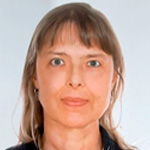 Natalia Irishina Kovaleva
Profesora del área de Matemáticas
Professor of Mathematics area
Doctora en Matemática Aplicada en 2009 por la Universidad de Carlos III de Madrid. Acreditada por ANECA en las figuras de Profesor Titular y Profesor de Universidad Privada. Su investigación ha sido centrada en el estudio de modelos matemáticos aplicados en medicina para el diagnóstico de imagen y optimización de los procesos quirúrgicos, y estudios de localización de fuentes fluorescentes en medios desordenados (Institut Langevin, Paris) . Ha publicado en diversas revistas indexadas, capítulos de libros editados por editoriales prestigiosas y en conferencias internacionales en el Área del Matemática Aplicada.
Natalia Irishina Kovaleva
Profesora del área de Matemáticas
Professor of Mathematics area
Doctora en Matemática Aplicada en 2009 por la Universidad de Carlos III de Madrid. Acreditada por ANECA en las figuras de Profesor Titular y Profesor de Universidad Privada. Su investigación ha sido centrada en el estudio de modelos matemáticos aplicados en medicina para el diagnóstico de imagen y optimización de los procesos quirúrgicos, y estudios de localización de fuentes fluorescentes en medios desordenados (Institut Langevin, Paris) . Ha publicado en diversas revistas indexadas, capítulos de libros editados por editoriales prestigiosas y en conferencias internacionales en el Área del Matemática Aplicada.
 Ravi Raj Khubchandani Khubchandani
Profesor del área de Programación
Professor of the Programming area
Ingeniero de software certificado por Microsoft. Especializado en tecnologías .NET. Graduado en ingeniería informática por la universidad de Las Palmas de Gran Canaria. Trabajando en la actualidad (desde mayo 2019) para Axpo en el departamento de inteligencia de mercados energéticos. Axpo es una empresa suiza dedicada a la energía y trading de productos financieros energéticos. Desarrollando en Axpo aplicaciones web, escritorio y servicios de Windows donde es prioritario la eficiencia y rapidez del algoritmo con trato con hubs de energía y mercados externos, así como aplicaciones para uso de empleados internos. Anteriormente con experiencia en distintas empresas de consultoría para empresas del sector energético e inmobiliario en España.
Ravi Raj Khubchandani Khubchandani
Profesor del área de Programación
Professor of the Programming area
Ingeniero de software certificado por Microsoft. Especializado en tecnologías .NET. Graduado en ingeniería informática por la universidad de Las Palmas de Gran Canaria. Trabajando en la actualidad (desde mayo 2019) para Axpo en el departamento de inteligencia de mercados energéticos. Axpo es una empresa suiza dedicada a la energía y trading de productos financieros energéticos. Desarrollando en Axpo aplicaciones web, escritorio y servicios de Windows donde es prioritario la eficiencia y rapidez del algoritmo con trato con hubs de energía y mercados externos, así como aplicaciones para uso de empleados internos. Anteriormente con experiencia en distintas empresas de consultoría para empresas del sector energético e inmobiliario en España.
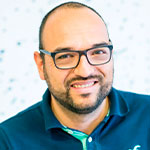 Jesús Omar Lacruz Jucht
Profesor del área de ingeniería de computadores
Computer engineering professor
Doctor en Ingeniería Electrónica por la Universidad Politécnica de Valencia y acreditado por la ANECA en las figuras de Profesor Ayudante Doctor y Contratado Doctor. Obtuvo el título de Ingeniero Electricista por la Universidad de Los Andes (ULA, Venezuela) en 2009, Master y Doctorado en Ingeniería Electrónica por la Universidad Politécnica de Valencia (2013 y 2016, respectivamente). Profesor en el área de electrónica y comunicaciones en la ULA (2010-2017). Actualmente Ingeniero de Investigación en la Fundación IMDEA Networks en Madrid desde 2017. Su trabajo en investigación se ha centrado en la implementación de sistemas de muy alta velocidad de procesado de señal y comunicaciones digitales en dispositivos FPGA, específicamente codificación de canal y sistemas de comunicaciones en la banda de onda milimétrica.
Jesús Omar Lacruz Jucht
Profesor del área de ingeniería de computadores
Computer engineering professor
Doctor en Ingeniería Electrónica por la Universidad Politécnica de Valencia y acreditado por la ANECA en las figuras de Profesor Ayudante Doctor y Contratado Doctor. Obtuvo el título de Ingeniero Electricista por la Universidad de Los Andes (ULA, Venezuela) en 2009, Master y Doctorado en Ingeniería Electrónica por la Universidad Politécnica de Valencia (2013 y 2016, respectivamente). Profesor en el área de electrónica y comunicaciones en la ULA (2010-2017). Actualmente Ingeniero de Investigación en la Fundación IMDEA Networks en Madrid desde 2017. Su trabajo en investigación se ha centrado en la implementación de sistemas de muy alta velocidad de procesado de señal y comunicaciones digitales en dispositivos FPGA, específicamente codificación de canal y sistemas de comunicaciones en la banda de onda milimétrica.
 Carlos Lli Torrabadella
Director del Grado en Ingeniería del Automóvil y del Máster en Ingeniería de la producción en la industria del automóvil. Profesor del área de organización, producción y proyectos
Director of the Bachelor's Degree in Automobile Engineering and the Master's Degree in Production Engineering in the automobile industry. Professor in the area of organization, production and projects
PhD en Dirección de Empresas Internacionales por la Universidad Nebrija, MBA-I / MIM por Thunderbird (AZ, EEUU), Especialista en Finanzas (Univ. Sta. María), Ingeniero Civil (Univ. Carabobo). Ha sido profesor de Grado y Posgrado en: Dirección de Operaciones, Internacionalización, Ingeniería Económica, Análisis de Entorno, Modelos de Desarrollo, Toma de decisiones con aplicaciones informáticas, Fundamentos de Economía, entre otras. Su experiencia profesional se ha desarrollado en el área industrial en las áreas de Gerencia de Planta, Operaciones, Calidad. Proyectos y Desarrollo de Negocios, con base en España, Latinoamérica y EEUU. Ha trabajado a nivel corporativo (Ford, Venepal, Bancoex) como en PYMES. Su área de investigación se centra en Modelos de Negocios, offshoring y servicios de alto valor añadido.
Carlos Lli Torrabadella
Director del Grado en Ingeniería del Automóvil y del Máster en Ingeniería de la producción en la industria del automóvil. Profesor del área de organización, producción y proyectos
Director of the Bachelor's Degree in Automobile Engineering and the Master's Degree in Production Engineering in the automobile industry. Professor in the area of organization, production and projects
PhD en Dirección de Empresas Internacionales por la Universidad Nebrija, MBA-I / MIM por Thunderbird (AZ, EEUU), Especialista en Finanzas (Univ. Sta. María), Ingeniero Civil (Univ. Carabobo). Ha sido profesor de Grado y Posgrado en: Dirección de Operaciones, Internacionalización, Ingeniería Económica, Análisis de Entorno, Modelos de Desarrollo, Toma de decisiones con aplicaciones informáticas, Fundamentos de Economía, entre otras. Su experiencia profesional se ha desarrollado en el área industrial en las áreas de Gerencia de Planta, Operaciones, Calidad. Proyectos y Desarrollo de Negocios, con base en España, Latinoamérica y EEUU. Ha trabajado a nivel corporativo (Ford, Venepal, Bancoex) como en PYMES. Su área de investigación se centra en Modelos de Negocios, offshoring y servicios de alto valor añadido.
 Jesús Daniel López Rodríguez
Profesor del área de Ingeniería de Computadores
Professor of the Computer Engineering area
Graduado en Ingeniería Electrónica Industrial con mención en Sistemas Electrónicos por la Universidad de Jaén y Máster en Ingeniería Mecatrónica por la misma universidad. Su trayectoria profesional abarca el desarrollo de software embarcado y diseño electrónico de aplicación espacial y médico. Otros intereses radican en los sistemas de control para equipos optrónicos de vigilancia de uso militar. Actualmente desempeña su actividad profesional en SEDECAL en el desarrollo de equipos de rayos X.
Jesús Daniel López Rodríguez
Profesor del área de Ingeniería de Computadores
Professor of the Computer Engineering area
Graduado en Ingeniería Electrónica Industrial con mención en Sistemas Electrónicos por la Universidad de Jaén y Máster en Ingeniería Mecatrónica por la misma universidad. Su trayectoria profesional abarca el desarrollo de software embarcado y diseño electrónico de aplicación espacial y médico. Otros intereses radican en los sistemas de control para equipos optrónicos de vigilancia de uso militar. Actualmente desempeña su actividad profesional en SEDECAL en el desarrollo de equipos de rayos X.
 Sonnia López Silva
Profesora de las áreas de Fundamentos de la Física y Estadística
Professor of the areas of Fundamentals of Physics and Statistics
Doctora en Ciencias Físicas por la Universidad Complutense de Madrid. Profesora acreditada por ACAP en las figuras de profesora contratada doctora y profesora de universidad privada. Ha impartido docencia en diversas universidades incluidas la Universidad de Las Palmas de Gran Canaria y la Universidad Pontifica de Comillas. Ha sido investigadora del Programa Ramón y Cajal y del subprograma Torres Quevedo. Ha desarrollado si labora investigadora en centros públicos y privados, incluidos el Instituto Universitario de Microelectrónica Aplicada (IUMA) o el Instituto de Microelectrónica de Madrid (IMM-CSIC). Ha participado en 15 proyectos de investigación y dispone de múltiples investigaciones y una patente. Sus líneas de investigación incluyen el uso de la optoelectrónica en aplicaciones sanitarias y deportivas.
Sonnia López Silva
Profesora de las áreas de Fundamentos de la Física y Estadística
Professor of the areas of Fundamentals of Physics and Statistics
Doctora en Ciencias Físicas por la Universidad Complutense de Madrid. Profesora acreditada por ACAP en las figuras de profesora contratada doctora y profesora de universidad privada. Ha impartido docencia en diversas universidades incluidas la Universidad de Las Palmas de Gran Canaria y la Universidad Pontifica de Comillas. Ha sido investigadora del Programa Ramón y Cajal y del subprograma Torres Quevedo. Ha desarrollado si labora investigadora en centros públicos y privados, incluidos el Instituto Universitario de Microelectrónica Aplicada (IUMA) o el Instituto de Microelectrónica de Madrid (IMM-CSIC). Ha participado en 15 proyectos de investigación y dispone de múltiples investigaciones y una patente. Sus líneas de investigación incluyen el uso de la optoelectrónica en aplicaciones sanitarias y deportivas.
 Daniel Magaña Martínez
Profesor del área de contenidos generales de la ingeniería y empresa
Professor of the general content area of engineering and business
Doctor en Ciencias Sociales (Dirección de Proyectos), Ingeniero en Informática, Máster en Dirección de Empresas Tecnológicas, Máster en Dirección y Gestión de Proyectos y PMP®. Con amplia experiencia en el mundo de la dirección de proyectos y en la dirección de departamentos de Informática, ha desarrollado su carrera profesional en torno a los Sistemas Informáticos, Service Desk y Helpdesk, desarrollando importantes proyectos en esos campos.
Daniel Magaña Martínez
Profesor del área de contenidos generales de la ingeniería y empresa
Professor of the general content area of engineering and business
Doctor en Ciencias Sociales (Dirección de Proyectos), Ingeniero en Informática, Máster en Dirección de Empresas Tecnológicas, Máster en Dirección y Gestión de Proyectos y PMP®. Con amplia experiencia en el mundo de la dirección de proyectos y en la dirección de departamentos de Informática, ha desarrollado su carrera profesional en torno a los Sistemas Informáticos, Service Desk y Helpdesk, desarrollando importantes proyectos en esos campos.Especializado en Dirección de Proyectos, centra su actividad investigadora en aspectos relacionados con los Sistemas de Alerta Temprana (Early Warning System) en el ámbito de los proyectos.
 Alonso Martín-Toledano García-Mauriño
Profesor del área de Sistemas Operativos, Sistemas Distribuidos y Redes
Professor in the area of Operating Systems, Distributed Systems and Networks
Ingeniero Informático y M.Sc. en Computación Cuántica por la Universidad Antonio de Nebrija. Trabajando en aQuantum en el cargo de Quantum Software Specialist, desempeñando funciones en la línea de Ingeniería de Software Cuántico en proyectos de gestión y creación de herramientas de desarrollo de software cuántico. Coautor del libro Ingeniería del Software Cuántico & QuantumPath®, y de dos artículos científicos publicados en revistas Q1 y Q2, relacionados con la búsqueda de alternativas a la tecnología CMOS para la construcción de circuitos computacionales.
Alonso Martín-Toledano García-Mauriño
Profesor del área de Sistemas Operativos, Sistemas Distribuidos y Redes
Professor in the area of Operating Systems, Distributed Systems and Networks
Ingeniero Informático y M.Sc. en Computación Cuántica por la Universidad Antonio de Nebrija. Trabajando en aQuantum en el cargo de Quantum Software Specialist, desempeñando funciones en la línea de Ingeniería de Software Cuántico en proyectos de gestión y creación de herramientas de desarrollo de software cuántico. Coautor del libro Ingeniería del Software Cuántico & QuantumPath®, y de dos artículos científicos publicados en revistas Q1 y Q2, relacionados con la búsqueda de alternativas a la tecnología CMOS para la construcción de circuitos computacionales.
 Francisco Marzal Baro
Profesor del área de programación
Professor of the programming area
Licenciado en Ciencias Matemáticas por la Universidad Complutense de Madrid. Máster en Diseño Industrial (Universidad Nebrija). Máster en Minería de Datos (Datamining) por la UNED. Actualmente trabaja como Quant developer desarrollando aplicaciones en C# para Axpo Trading AG. Tiene amplia experiencia como consultor en la empresa privada en el sector de las Tecnologías de la Información.
Francisco Marzal Baro
Profesor del área de programación
Professor of the programming area
Licenciado en Ciencias Matemáticas por la Universidad Complutense de Madrid. Máster en Diseño Industrial (Universidad Nebrija). Máster en Minería de Datos (Datamining) por la UNED. Actualmente trabaja como Quant developer desarrollando aplicaciones en C# para Axpo Trading AG. Tiene amplia experiencia como consultor en la empresa privada en el sector de las Tecnologías de la Información.
 Clara Matutano Molina
Profesora del área de ingeniería del software, sistemas de información y sistemas inteligentes
Professor of the area of software engineering, information systems and intelligent systems
Doctora Ingeniera de Caminos, Canales y Puertos por la Universidad Politécnica de Madrid. Como especialista en Ingeniería marítima y portuaria, cuenta con más de 11 años de experiencia profesional en la gestión de proyectos de I+D+i. Actualmente, desarrolla su actividad investigadora dentro del Grupo de Investigación ARIES (Inteligencia Artificial y Sistemas Emergentes) en la Universidad Antonio de Nebrija. Cuenta con más de 10 años de experiencia impartiendo asignaturas técnicas en diferentes universidades como la UPM, la UEM y en la UFV. Está acreditada por la ANECA como Contratada Doctora y Profesora de Universidad Privada; y cuenta con un sexenio de investigación. Actualmente, desarrolla su labor docente como profesora en el Grado en Física Aplicada y en el Grado en Ingeniería Informática.
Clara Matutano Molina
Profesora del área de ingeniería del software, sistemas de información y sistemas inteligentes
Professor of the area of software engineering, information systems and intelligent systems
Doctora Ingeniera de Caminos, Canales y Puertos por la Universidad Politécnica de Madrid. Como especialista en Ingeniería marítima y portuaria, cuenta con más de 11 años de experiencia profesional en la gestión de proyectos de I+D+i. Actualmente, desarrolla su actividad investigadora dentro del Grupo de Investigación ARIES (Inteligencia Artificial y Sistemas Emergentes) en la Universidad Antonio de Nebrija. Cuenta con más de 10 años de experiencia impartiendo asignaturas técnicas en diferentes universidades como la UPM, la UEM y en la UFV. Está acreditada por la ANECA como Contratada Doctora y Profesora de Universidad Privada; y cuenta con un sexenio de investigación. Actualmente, desarrolla su labor docente como profesora en el Grado en Física Aplicada y en el Grado en Ingeniería Informática.
 Jorge Mayo Vilches
Profesor del área de Ingeniería de Computadores
Professor of the Computer Engineering area
Graduado en Ingeniería en Electrónica de Comunicaciones por la Universidad Alcalá de Henares, Master en Ingeniería superior de Telecomunicaciones por la Universitat Oberta de Catalunya, Master en dirección y gestión de proyectos (Project management) por la Universidad Nebrija colaboración IMF Business School y Master de negocios y marketing digital, programa FutureLeaders. Con una trayectoria profesional que abarca docencia, automatización de procesos en Repsol, desarrollo firmware para equipos IFF y EGSES en Indra y Airbus Espacio y Defensa respectivamente. Más recientemente, Ingeniero Firmware en Tecnobit y actualmente Ingeniero Electrónico en Thales Alenia.
Jorge Mayo Vilches
Profesor del área de Ingeniería de Computadores
Professor of the Computer Engineering area
Graduado en Ingeniería en Electrónica de Comunicaciones por la Universidad Alcalá de Henares, Master en Ingeniería superior de Telecomunicaciones por la Universitat Oberta de Catalunya, Master en dirección y gestión de proyectos (Project management) por la Universidad Nebrija colaboración IMF Business School y Master de negocios y marketing digital, programa FutureLeaders. Con una trayectoria profesional que abarca docencia, automatización de procesos en Repsol, desarrollo firmware para equipos IFF y EGSES en Indra y Airbus Espacio y Defensa respectivamente. Más recientemente, Ingeniero Firmware en Tecnobit y actualmente Ingeniero Electrónico en Thales Alenia.
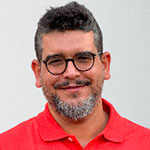 Carlos Mestre Cebrián
Profesor del área de Programación y del área de Ingeniería del Software, Sistemas de Información y Sistemas Inteligentes
Professor of the Programming area and the Software Engineering, Information Systems and Intelligent Systems area
Ingeniero de telecomunicaciones con múltiple especialidad en comunicaciones inalámbricas y electrónica por la universidad del Shanon, en Irlanda (2009), y en redes y telemática por la universidad politécnica de Valencia (2011). Con experiencia variada en el campo del desarrollo de software y soluciones tecnológicas. En general, fuertemente asociado a la gestión de producción en conglomerados de fábricas multinacionales. 4 años de ellos en Alemania. También ha contribuido en campos diversos como marketing, búsqueda basada en procesamiento de lenguaje natural (NPL), procesamiento de video en tiempo real e I+D en prototipos para automoción V2X. Entre los clientes finales podemos encontrar perfiles como, Panasonic, banco Santander o Ciudad de Barcelona.
Carlos Mestre Cebrián
Profesor del área de Programación y del área de Ingeniería del Software, Sistemas de Información y Sistemas Inteligentes
Professor of the Programming area and the Software Engineering, Information Systems and Intelligent Systems area
Ingeniero de telecomunicaciones con múltiple especialidad en comunicaciones inalámbricas y electrónica por la universidad del Shanon, en Irlanda (2009), y en redes y telemática por la universidad politécnica de Valencia (2011). Con experiencia variada en el campo del desarrollo de software y soluciones tecnológicas. En general, fuertemente asociado a la gestión de producción en conglomerados de fábricas multinacionales. 4 años de ellos en Alemania. También ha contribuido en campos diversos como marketing, búsqueda basada en procesamiento de lenguaje natural (NPL), procesamiento de video en tiempo real e I+D en prototipos para automoción V2X. Entre los clientes finales podemos encontrar perfiles como, Panasonic, banco Santander o Ciudad de Barcelona.
 Federico Muñoz Babiano
Profesor del área de Ingeniería de Computadore
Professor of the Computer Engineering area
Ingeniero electrónico por la universidad de Alcalá de Henares. Tiene experiencia de más de 15 años en I+D, empresas internacionales y startups, asumiendo diferentes responsabilidades e involucrado en las diferentes fases de desarrollo de los proyectos de innovación. Su participación en diversos proyectos ha constatado su capacidad de trabajo en equipo y liderazgo. Tiene amplia experiencia para diseñar, desarrollar y probar productos en diferentes sectores y con diferentes tipos de tecnologías.
Federico Muñoz Babiano
Profesor del área de Ingeniería de Computadore
Professor of the Computer Engineering area
Ingeniero electrónico por la universidad de Alcalá de Henares. Tiene experiencia de más de 15 años en I+D, empresas internacionales y startups, asumiendo diferentes responsabilidades e involucrado en las diferentes fases de desarrollo de los proyectos de innovación. Su participación en diversos proyectos ha constatado su capacidad de trabajo en equipo y liderazgo. Tiene amplia experiencia para diseñar, desarrollar y probar productos en diferentes sectores y con diferentes tipos de tecnologías.
 Fernando Murúa Alcázar
Profesor del área de Programación
Professor of the Programming area
Ingeniero Informático por la Universidad Antonio de Nebrija en el año 2022. Durante la carrera estuvo desarrollando su perfil profesional como freelance, ofreciendo servicios de creación de aplicaciones/páginas web a medida para pequeñas y medianas empresas y ayudarlas en su transformación digital. Actualmente, se encuentra trabajando como analista en Deloitte, donde sus principales funciones son el desarrollo de software. Además, estuvo un año de prácticas en BQ Educación donde pudo desarrollar amplias habilidades en el campo del desarrollo tanto front-end como back-end.
Fernando Murúa Alcázar
Profesor del área de Programación
Professor of the Programming area
Ingeniero Informático por la Universidad Antonio de Nebrija en el año 2022. Durante la carrera estuvo desarrollando su perfil profesional como freelance, ofreciendo servicios de creación de aplicaciones/páginas web a medida para pequeñas y medianas empresas y ayudarlas en su transformación digital. Actualmente, se encuentra trabajando como analista en Deloitte, donde sus principales funciones son el desarrollo de software. Además, estuvo un año de prácticas en BQ Educación donde pudo desarrollar amplias habilidades en el campo del desarrollo tanto front-end como back-end.
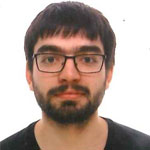 Álvaro Pereira Albert
Profesor del área de Matemáticas
Professor of mathematics area
Graduado en Matemáticas en la Universidad Autónoma de Madrid.
Álvaro Pereira Albert
Profesor del área de Matemáticas
Professor of mathematics area
Graduado en Matemáticas en la Universidad Autónoma de Madrid.
 Alberto Pozuelo Mozas
Profesor del área de contenidos generales de la ingeniería y empresa
Professor of the general content area of engineering and business
Grado en Ingeniería Informática por la Universidad Oberta de Catalunya. Ha ampliado su formación como ingeniero informático con varias certificaciones de Red Hat y Master en Gestión de Proyectos (PMP). Actualmente, el puesto que desempeña en Opensistemas es Service Delivery Support Manager and Technical Leader donde trabaja con tecnología de Infraestructura bajo Código (IaC) tanto en diferentes Cloud (Azure, AWS and GCP) como Onpremise. Anteriormente, estuvo embarcado en el rol de responsable de Sistemas Críticos de FREMAP durante 9 años, donde estuvo gestionando infraestructura física como CPD, enclosures, cabinas backup y almacenamiento, además de todos los sistemas Linux y HP-UX. Los 17 años de experiencia laboral donde empezó cambiando cartuchos de tinta a impresoras hasta la actualidad, le han nutrido de una visión experimentada y global de todo un ciclo de vida dedicada a la informática (su vocación).
Alberto Pozuelo Mozas
Profesor del área de contenidos generales de la ingeniería y empresa
Professor of the general content area of engineering and business
Grado en Ingeniería Informática por la Universidad Oberta de Catalunya. Ha ampliado su formación como ingeniero informático con varias certificaciones de Red Hat y Master en Gestión de Proyectos (PMP). Actualmente, el puesto que desempeña en Opensistemas es Service Delivery Support Manager and Technical Leader donde trabaja con tecnología de Infraestructura bajo Código (IaC) tanto en diferentes Cloud (Azure, AWS and GCP) como Onpremise. Anteriormente, estuvo embarcado en el rol de responsable de Sistemas Críticos de FREMAP durante 9 años, donde estuvo gestionando infraestructura física como CPD, enclosures, cabinas backup y almacenamiento, además de todos los sistemas Linux y HP-UX. Los 17 años de experiencia laboral donde empezó cambiando cartuchos de tinta a impresoras hasta la actualidad, le han nutrido de una visión experimentada y global de todo un ciclo de vida dedicada a la informática (su vocación).
 Adrián Pradilla Portoles
Profesor de las áreas de Sistemas Operativos, Sistemas Distribuidos y Redes
Professor of the areas of Operating Systems, Distributed Systems and Networks
Licenciado en Ingeniería Informática e Ingeniero Técnico en Informática de Sistemas por la Universidad Antonio de Nebrija. Ha ampliado su formación como ingeniero informático con el Master Ejecutivo de Inteligencia Artificial del IIA, Bootcamp de Tokenización de Tutellus, así como con el Master de Marketing y Publicidad de la Universidad Antonio de Nebrija.
Actualmente es Head of IT en la consultora Open Sistemas. Anteriormente estuvo embarcado en la aplicación Open Source Gobierto, la cual permite a las administraciones públicas y otras entidades poner en marcha iniciativas de transparencia y participación. También fue responsable de programación e informática en ideas4all, SAAS de innovación abierta para transformar innovando las organizaciones y contribuyó en proyectos en FREMAP, UNED, IBM o 20minutos.
Desde el punto de vista de su actividad docente ha impartido durante los últimos años en la Universidad Nebrija prácticas de Programación avanzada, así como las asignaturas de Internet de las cosas, Programación de sistemas distribuidos; además, es tutor académico de las practicas curriculares y responsable del Club de Informática.
Adrián Pradilla Portoles
Profesor de las áreas de Sistemas Operativos, Sistemas Distribuidos y Redes
Professor of the areas of Operating Systems, Distributed Systems and Networks
Licenciado en Ingeniería Informática e Ingeniero Técnico en Informática de Sistemas por la Universidad Antonio de Nebrija. Ha ampliado su formación como ingeniero informático con el Master Ejecutivo de Inteligencia Artificial del IIA, Bootcamp de Tokenización de Tutellus, así como con el Master de Marketing y Publicidad de la Universidad Antonio de Nebrija.
Actualmente es Head of IT en la consultora Open Sistemas. Anteriormente estuvo embarcado en la aplicación Open Source Gobierto, la cual permite a las administraciones públicas y otras entidades poner en marcha iniciativas de transparencia y participación. También fue responsable de programación e informática en ideas4all, SAAS de innovación abierta para transformar innovando las organizaciones y contribuyó en proyectos en FREMAP, UNED, IBM o 20minutos.
Desde el punto de vista de su actividad docente ha impartido durante los últimos años en la Universidad Nebrija prácticas de Programación avanzada, así como las asignaturas de Internet de las cosas, Programación de sistemas distribuidos; además, es tutor académico de las practicas curriculares y responsable del Club de Informática.
 Paloma Romera García
Profesora del área de transformación digital
Professor of the digital transformation area
Ingeniera en Informática por la Universidad Politécnica de Madrid. Su experiencia se ha desarrollado en diversas empresas del sector IT, especialmente en IBM donde durante los últimos 20 años ha desempeñado sus funciones en las áreas de desarrollo IT, arquitectura empresarial y consultoría de continuidad de negocio, comercial y preventa. Colabora habitualmente con distintas Universidades en conferencias, docencia y comités de asesoramiento.
Paloma Romera García
Profesora del área de transformación digital
Professor of the digital transformation area
Ingeniera en Informática por la Universidad Politécnica de Madrid. Su experiencia se ha desarrollado en diversas empresas del sector IT, especialmente en IBM donde durante los últimos 20 años ha desempeñado sus funciones en las áreas de desarrollo IT, arquitectura empresarial y consultoría de continuidad de negocio, comercial y preventa. Colabora habitualmente con distintas Universidades en conferencias, docencia y comités de asesoramiento.
 Rocío Ruíz Ruíz
Profesora del área de Ingeniería del Software, Sistemas de Información y Sistemas Inteligentes
Professor in the area of Software Engineering, Information Systems and Intelligent Systems
Graduada en Ingeniería Informática por la Universidad Antonio de Nebrija con mención en Bases de datos, Sistemas distribuidos y el Trabajo de Fin de Grado. Actualmente trabaja como Ingeniera de Machine Learning en una Start-Up, Langoo. Su trabajo en el campo de la Inteligencia Artificial está enfocado al Procesamiento del Lenguaje Natural y Reconocimiento Automático de Voz. Aptitudes en gestión de personas con la empresa tecnológica Atos, a nivel nacional e internacional.
Rocío Ruíz Ruíz
Profesora del área de Ingeniería del Software, Sistemas de Información y Sistemas Inteligentes
Professor in the area of Software Engineering, Information Systems and Intelligent Systems
Graduada en Ingeniería Informática por la Universidad Antonio de Nebrija con mención en Bases de datos, Sistemas distribuidos y el Trabajo de Fin de Grado. Actualmente trabaja como Ingeniera de Machine Learning en una Start-Up, Langoo. Su trabajo en el campo de la Inteligencia Artificial está enfocado al Procesamiento del Lenguaje Natural y Reconocimiento Automático de Voz. Aptitudes en gestión de personas con la empresa tecnológica Atos, a nivel nacional e internacional.
 Rafael Julio Sánchez Lamoneda
Profesor del área de Matemáticas
Professor of mathematics
PhD en Matemáticas de Brandeis University, Massachusetts, USA, con equivalencia de la Universidad Carlos III de Madrid.Evaluación positiva de ANECA en las figuras de profesor Contratado Doctor y Profesor de Universidad Privada. Ha escrito varios artículos sobre Algebra Conmutativa y Homológica en revistas internacionales y ha sido tutor de estudiantes para la elaboración de sus tesis de pregrado, maestría y doctorado en matemáticas y en educación matemática. Fue jefe del Departamento de Matemáticas del Instituto Venezolano de Investigaciones Científicas, IVIC y miembro de la Comisión de postgrado de ese Instituto y de la Escuela de Matemáticas de la Universidad Central de Venezuela, UCV. Formé parte de equipos multidisciplinarios para el mejoramiento de la enseñanza de las matemáticas en el Centro Nacional para el Mejoramiento de la Enseñanza de la Ciencia, CENAMEC, en Venezuela. Premio Erdös 2010 otorgado por la World Federation for National Mathematical Competitions. Premio al mejor trabajo en el área de Matemáticas otorgado por el Consejo Nacional de Investigaciones Científicas y Tecnológicas de Venezuela, Conicit en el año 1993. Orden José María Vargas, UCV, 2007. Ha trabajado en las Olimpiadas Matemáticas en Venezuela desde 1978, he sido jefe o tutor de delegaciones del país en Olimpiadas de Matemáticas Internacionales desde 1981. Actual presidente del Comité de Ética de la Olimpiada Internacional de Matemáticas, IMO y miembro del consejo asesor por elección desde 2012 al 2016. Asesor de la Organización de Estados Iberoamericanos para la Educación la Ciencia y la Cultura, OEI, en el área de Matemáticas y Olimpiadas Matemáticas. Asesor en el área de Matemáticas de la Academia de Ciencias Físicas, Matemáticas y Naturales de Venezuela. Presidente de la Asociación Venezolana de Competencias Matemáticas y de la Asociación Matemática Venezolana.
Rafael Julio Sánchez Lamoneda
Profesor del área de Matemáticas
Professor of mathematics
PhD en Matemáticas de Brandeis University, Massachusetts, USA, con equivalencia de la Universidad Carlos III de Madrid.Evaluación positiva de ANECA en las figuras de profesor Contratado Doctor y Profesor de Universidad Privada. Ha escrito varios artículos sobre Algebra Conmutativa y Homológica en revistas internacionales y ha sido tutor de estudiantes para la elaboración de sus tesis de pregrado, maestría y doctorado en matemáticas y en educación matemática. Fue jefe del Departamento de Matemáticas del Instituto Venezolano de Investigaciones Científicas, IVIC y miembro de la Comisión de postgrado de ese Instituto y de la Escuela de Matemáticas de la Universidad Central de Venezuela, UCV. Formé parte de equipos multidisciplinarios para el mejoramiento de la enseñanza de las matemáticas en el Centro Nacional para el Mejoramiento de la Enseñanza de la Ciencia, CENAMEC, en Venezuela. Premio Erdös 2010 otorgado por la World Federation for National Mathematical Competitions. Premio al mejor trabajo en el área de Matemáticas otorgado por el Consejo Nacional de Investigaciones Científicas y Tecnológicas de Venezuela, Conicit en el año 1993. Orden José María Vargas, UCV, 2007. Ha trabajado en las Olimpiadas Matemáticas en Venezuela desde 1978, he sido jefe o tutor de delegaciones del país en Olimpiadas de Matemáticas Internacionales desde 1981. Actual presidente del Comité de Ética de la Olimpiada Internacional de Matemáticas, IMO y miembro del consejo asesor por elección desde 2012 al 2016. Asesor de la Organización de Estados Iberoamericanos para la Educación la Ciencia y la Cultura, OEI, en el área de Matemáticas y Olimpiadas Matemáticas. Asesor en el área de Matemáticas de la Academia de Ciencias Físicas, Matemáticas y Naturales de Venezuela. Presidente de la Asociación Venezolana de Competencias Matemáticas y de la Asociación Matemática Venezolana.
 Ángel Luís Sánchez López
Profesor del área de Competencias Profesionales
Professor of Professional Competences area
Ingeniero Industrial del ICAI, Psicólogo Experto en Coaching (PsEC®) por el Colegio Oficial de Psicólogos de Madrid, Psicoterapeuta y docente en la Universidad Antonio de Nebrija. Es Executive MBA por el Instituto de Empresa Business School. Máster en Comunicación Integral, Experto en Comunicación No Verbal y en Inteligencia Emocional por la Universidad de Alcalá de Henares. Máster en Psicología General Sanitaria por la Universidad Internacional de Valencia. Máster en Intervención Psicológica por la Universidad de Valencia. Especialista en Terapia y Consultoría Sistémicas por la Universidad de Alcalá de Henares. Máster en Psicoterapia Humanista Integrativa y Máster en Psicoterapia Humanista Experiencial y en Terapia Focalizada en la Emoción por la Universidad Pontificia Comillas. Está certificado por AECOP como Coach Profesional Ejecutivo.
Ángel Luís Sánchez López
Profesor del área de Competencias Profesionales
Professor of Professional Competences area
Ingeniero Industrial del ICAI, Psicólogo Experto en Coaching (PsEC®) por el Colegio Oficial de Psicólogos de Madrid, Psicoterapeuta y docente en la Universidad Antonio de Nebrija. Es Executive MBA por el Instituto de Empresa Business School. Máster en Comunicación Integral, Experto en Comunicación No Verbal y en Inteligencia Emocional por la Universidad de Alcalá de Henares. Máster en Psicología General Sanitaria por la Universidad Internacional de Valencia. Máster en Intervención Psicológica por la Universidad de Valencia. Especialista en Terapia y Consultoría Sistémicas por la Universidad de Alcalá de Henares. Máster en Psicoterapia Humanista Integrativa y Máster en Psicoterapia Humanista Experiencial y en Terapia Focalizada en la Emoción por la Universidad Pontificia Comillas. Está certificado por AECOP como Coach Profesional Ejecutivo.Cuenta con más de 23 años de experiencia en posiciones directivas, gestionando personas y negocio en el mundo de las telecomunicaciones a nivel multinacional, en áreas relacionadas con ventas, marketing y proyectos tecnológicos. En el campo de la intervención tiene dilatada experiencia en Coaching Ejecutivo y en Psicoterapia. En el ámbito de la formación, es ponente de diversos Institutos y Universidades en áreas relacionadas con el desarrollo de competencias profesionales, liderazgo, psicología y coaching. En la actualidad se dedica principalmente al Coaching Ejecutivo, la Psicoterapia y la Docencia Universitaria.
 Rafael Sánchez Sánchez
Profesor del área de Ingeniería del Software, Sistemas de Información y Sistemas Inteligentes
Professor in the area of Software Engineering, Information Systems and Intelligent Systems
Graduado en Ingeniería Informática y en Matemáticas por la Universidad Autónoma de Madrid (UAM). Cofundador de la startup FesteaPay y de la consultora Negative Epsilon. En la parte técnica, diseñador y programador de los productos que se desarrollan, centrado en la parte de Front, pero llegando al diseño de datos y el Back. También ha desarrollado pequeñas labores de plataforma, como despliegues e implementación de flujos de integración continua.
Rafael Sánchez Sánchez
Profesor del área de Ingeniería del Software, Sistemas de Información y Sistemas Inteligentes
Professor in the area of Software Engineering, Information Systems and Intelligent Systems
Graduado en Ingeniería Informática y en Matemáticas por la Universidad Autónoma de Madrid (UAM). Cofundador de la startup FesteaPay y de la consultora Negative Epsilon. En la parte técnica, diseñador y programador de los productos que se desarrollan, centrado en la parte de Front, pero llegando al diseño de datos y el Back. También ha desarrollado pequeñas labores de plataforma, como despliegues e implementación de flujos de integración continua.
 José Emilio Torres Matesanz
Profesor del área de Lenguajes y Sistemas Informáticos
Professor of the area of Computer Languages and Systems
Ingeniero Técnico Industrial e Ingeniero en Automática y Electrónica Industrial por la Universidad Politécnica de Madrid. Ha realizado el Máster en Automática y Electrónica Industrial dentro del plan de postgrado de la Universidad Politécnica de Madrid. Su experiencia docente e investigadora se ha desarrollado en el grupo de Investigación de Robótica y Cibernética (ROBCIB) de la Universidad Politécnica de Madrid, y en la Universidad Antonio de Nebrija, tomando parte en diversos proyectos de investigación. Actualmente es Director de Producción y Responsable Técnico en la empresa SPOTLAB SL.
José Emilio Torres Matesanz
Profesor del área de Lenguajes y Sistemas Informáticos
Professor of the area of Computer Languages and Systems
Ingeniero Técnico Industrial e Ingeniero en Automática y Electrónica Industrial por la Universidad Politécnica de Madrid. Ha realizado el Máster en Automática y Electrónica Industrial dentro del plan de postgrado de la Universidad Politécnica de Madrid. Su experiencia docente e investigadora se ha desarrollado en el grupo de Investigación de Robótica y Cibernética (ROBCIB) de la Universidad Politécnica de Madrid, y en la Universidad Antonio de Nebrija, tomando parte en diversos proyectos de investigación. Actualmente es Director de Producción y Responsable Técnico en la empresa SPOTLAB SL.
 Alberto Valero Gómez
Profesor del área de programación
Professor of the programming area
Doctor en Ingeniería Informática y de Sistemas por la Universidad Sapienza de Roma e Ingeniero Industrial por la Universidad Politécnica de Madrid. Evaluado positivamente por la ACAP en las categorías de Ayudante Doctor, Profesor Contratado Doctor y Profesor Contratado Doctor de Universidad Privada. Ha impartido docencia Universitaria en la Universidad Carlos III de Madrid de 2011 a 2014 en los grados de Ingeniería Electrónica, Ingeniería Automática y de Sistemas, Ingeniería Mecánica e Ingeniería Informática además de en el Máster de Robótica e Inteligencia Artificial. Ha trabajado en el Máster de Formación al Profesorado de Secundaria en la Universidad de Alcalá de Henares y la Universidad Rey Juan Carlos de Madrid en 2016 y 2017 y como coordinador y profesor del Experto Universitario en Programación y Robótica de la Universidad Internacional de la Rioja desde 2014. Desde 2013 es el director de la división educativa de la tecnológica española BQ.
Alberto Valero Gómez
Profesor del área de programación
Professor of the programming area
Doctor en Ingeniería Informática y de Sistemas por la Universidad Sapienza de Roma e Ingeniero Industrial por la Universidad Politécnica de Madrid. Evaluado positivamente por la ACAP en las categorías de Ayudante Doctor, Profesor Contratado Doctor y Profesor Contratado Doctor de Universidad Privada. Ha impartido docencia Universitaria en la Universidad Carlos III de Madrid de 2011 a 2014 en los grados de Ingeniería Electrónica, Ingeniería Automática y de Sistemas, Ingeniería Mecánica e Ingeniería Informática además de en el Máster de Robótica e Inteligencia Artificial. Ha trabajado en el Máster de Formación al Profesorado de Secundaria en la Universidad de Alcalá de Henares y la Universidad Rey Juan Carlos de Madrid en 2016 y 2017 y como coordinador y profesor del Experto Universitario en Programación y Robótica de la Universidad Internacional de la Rioja desde 2014. Desde 2013 es el director de la división educativa de la tecnológica española BQ.
 Christian Velasco Gallego
Profesor del área de ingeniería del software, sistemas de información y sistemas inteligentes
Professor of the area of software engineering, information systems and intelligent systems
Graduado en Ingeniería en Sistemas y Tecnología Naval y Doctor en Arquitectura Naval e Ingeniería Marina y Oceánica por la Universidad de Strathclyde (Glasgow, Reino Unido). Presenta experiencia investigadora en la aplicación de la inteligencia artificial para el mantenimiento inteligente de sistemas navales. También posee experiencia profesional como consultor técnico para la implementación de herramientas de Business Intelligence y el desarrollo de software personalizado. Sus principales intereses se centran en smart maintenance, real-time intelligent systems, computer vision, digital twins, y digital supply chain.
Christian Velasco Gallego
Profesor del área de ingeniería del software, sistemas de información y sistemas inteligentes
Professor of the area of software engineering, information systems and intelligent systems
Graduado en Ingeniería en Sistemas y Tecnología Naval y Doctor en Arquitectura Naval e Ingeniería Marina y Oceánica por la Universidad de Strathclyde (Glasgow, Reino Unido). Presenta experiencia investigadora en la aplicación de la inteligencia artificial para el mantenimiento inteligente de sistemas navales. También posee experiencia profesional como consultor técnico para la implementación de herramientas de Business Intelligence y el desarrollo de software personalizado. Sus principales intereses se centran en smart maintenance, real-time intelligent systems, computer vision, digital twins, y digital supply chain.
 Diego Vicente Matías
Profesor del área de Matemáticas
Professor of mathematics
Licenciado en Física por la Universidad Complutense de Madrid y Máster en Cambio Global por la Universidad Internacional Menéndez Pelayo. Autor del artículo 'Cambio climático: ¿Somos responsables? ¿Podemos hacer algo al respecto?' del Manual de primeros auxilios (artísticos) para un planeta herido de Ediciones Asimétricas, tras una ponencia sobre “Conceptos generales del Sistema Climático Terrestre” en la Universidad Complutense de Madrid. Colaboración con el Instituto de Ciencias del Mar para la realización del trabajo de fin de Máster. Opositando para la especialidad de Radiofísica Hospitalaria.
Diego Vicente Matías
Profesor del área de Matemáticas
Professor of mathematics
Licenciado en Física por la Universidad Complutense de Madrid y Máster en Cambio Global por la Universidad Internacional Menéndez Pelayo. Autor del artículo 'Cambio climático: ¿Somos responsables? ¿Podemos hacer algo al respecto?' del Manual de primeros auxilios (artísticos) para un planeta herido de Ediciones Asimétricas, tras una ponencia sobre “Conceptos generales del Sistema Climático Terrestre” en la Universidad Complutense de Madrid. Colaboración con el Instituto de Ciencias del Mar para la realización del trabajo de fin de Máster. Opositando para la especialidad de Radiofísica Hospitalaria.
 Juan Viguri Flores
Coordinador y profesor del área de Empresa
Coordinator and Professor of the Business area
Doctor Ingeniero Industrial por la Universidad Nebrija. Ingeniero Industrial por la Universidad del País Vasco, Escuela de Ingeniería de Bilbao. Director de Planificación Corporativa de Aceralia. En la Universidad Antonio Nebrija, delegado del Rector para la calidad. En la actualidad, en la Escuela Politécnica Superior, es coordinador del programa internacional, y de las prácticas curriculares y extracurriculares en empresa. Además, en el ámbito docente, tiene más de 25 años de experiencia como coordinador y profesor del área de empresa, en asignaturas tanto de Grado como de Máster. Durante varios años ha dirigido un proyecto de investigación con Arcelor para la recuperación de residuos industriales.
Juan Viguri Flores
Coordinador y profesor del área de Empresa
Coordinator and Professor of the Business area
Doctor Ingeniero Industrial por la Universidad Nebrija. Ingeniero Industrial por la Universidad del País Vasco, Escuela de Ingeniería de Bilbao. Director de Planificación Corporativa de Aceralia. En la Universidad Antonio Nebrija, delegado del Rector para la calidad. En la actualidad, en la Escuela Politécnica Superior, es coordinador del programa internacional, y de las prácticas curriculares y extracurriculares en empresa. Además, en el ámbito docente, tiene más de 25 años de experiencia como coordinador y profesor del área de empresa, en asignaturas tanto de Grado como de Máster. Durante varios años ha dirigido un proyecto de investigación con Arcelor para la recuperación de residuos industriales.
Profesores del Diploma en Transformación Digital
Diploma in Digital Transformation Professors
1. Transformación digital de las empresas y la sociedad. Casos de Éxito 1. Digital transformation of companies and society. Success stories
 Maite González Mac Dowell
Profesora del Área de Transformación Digital
Professor of the Digital Transformation Area
Licenciada en Ciencias Biológicas por la Universidad Complutense de Madrid y Master en Estrategia e Innovación en Saïd Business School, Oxford University. Con una experiencia de algo más de 30 años en IBM, ha desempeñado funciones en las áreas de consultoría de negocio y desarrollo IT trabajando para clientes a nivel nacional e internacional en el ámbito Europeo; está certificada en la gestión de proyectos complejos, y ha liderado distintos procesos de transformación interna, incluyendo la creación de diversas organizaciones y la elaboración del plan estratégico de servicios a nivel global. En la actualidad es la líder de innovación en la organización de servicios de consultoría de IBM Europa, desde donde ofrece asesoramiento y acompañamiento a los clientes de la empresa en sus procesos de Innovación y Transformación Digital. Adicionalmente es miembro del Europe Diversity and Inclusion Council, y ha colaborado con distintas Universidades y Escuelas de Negocio en conferencias y actividades docentes.
Maite González Mac Dowell
Profesora del Área de Transformación Digital
Professor of the Digital Transformation Area
Licenciada en Ciencias Biológicas por la Universidad Complutense de Madrid y Master en Estrategia e Innovación en Saïd Business School, Oxford University. Con una experiencia de algo más de 30 años en IBM, ha desempeñado funciones en las áreas de consultoría de negocio y desarrollo IT trabajando para clientes a nivel nacional e internacional en el ámbito Europeo; está certificada en la gestión de proyectos complejos, y ha liderado distintos procesos de transformación interna, incluyendo la creación de diversas organizaciones y la elaboración del plan estratégico de servicios a nivel global. En la actualidad es la líder de innovación en la organización de servicios de consultoría de IBM Europa, desde donde ofrece asesoramiento y acompañamiento a los clientes de la empresa en sus procesos de Innovación y Transformación Digital. Adicionalmente es miembro del Europe Diversity and Inclusion Council, y ha colaborado con distintas Universidades y Escuelas de Negocio en conferencias y actividades docentes.
2. Cloud Computing. Herramientas y aplicaciones 2. Cloud Computing. Tools and Applications
 Paloma Romera García
Profesora del área de Transformación Digital
Professor of the Digital Transformation Area
Su experiencia se ha desarrollado en diversas empresas del sector IT, especialmente en IBM donde durante los últimos 18 años ha desempeñado sus funciones en las áreas de desarrollo IT, arquitectura empresarial y consultoría de continuidad de negocio, comercial y preventa. Colabora habitualmente con distintas Universidades en conferencias, docencia y comités de asesoramiento.
Paloma Romera García
Profesora del área de Transformación Digital
Professor of the Digital Transformation Area
Su experiencia se ha desarrollado en diversas empresas del sector IT, especialmente en IBM donde durante los últimos 18 años ha desempeñado sus funciones en las áreas de desarrollo IT, arquitectura empresarial y consultoría de continuidad de negocio, comercial y preventa. Colabora habitualmente con distintas Universidades en conferencias, docencia y comités de asesoramiento.
 Beatriz Magán Pinto
Profesora del Área de Transformación Digital
Professor of the Digital Transformation Area
Ingeniera informática (UFV). Máster en Inteligencia Artificial (UNIR) y MBA por la UPM. Investigaciones realizadas en las áreas de Procesamiento de Lenguaje Natural, Deep Learning e Inteligencia Artificial en los institutos de investigación CEIEC (UFV), Instituto Robert Schuman de Estudios Europeos (UFV) y Avanade. También ha trabajado en el campo de la Ingeniería de software IT en la empresa CNAF (París). Adicionalmente, graduada en Relaciones Internacionales (URJC).
Beatriz Magán Pinto
Profesora del Área de Transformación Digital
Professor of the Digital Transformation Area
Ingeniera informática (UFV). Máster en Inteligencia Artificial (UNIR) y MBA por la UPM. Investigaciones realizadas en las áreas de Procesamiento de Lenguaje Natural, Deep Learning e Inteligencia Artificial en los institutos de investigación CEIEC (UFV), Instituto Robert Schuman de Estudios Europeos (UFV) y Avanade. También ha trabajado en el campo de la Ingeniería de software IT en la empresa CNAF (París). Adicionalmente, graduada en Relaciones Internacionales (URJC).
3. Internet de las Cosas. Conceptos y plataformas 3. Internet of Things. Concepts and platforms
 Adrián Pradilla Pórtoles
Profesor de las áreas de Sistemas Operativos, Sistemas Distribuidos y Redes
Professor of the areas of Operating Systems, Distributed Systems and Networks
Desarrollador de Ruby on Rails en Open Sistemas desde Abril de 2018. Anteriormente estuvo embarcado en la aplicación Open Source Gobierto, la cual permite a las administraciones públicas y otras entidades poner en marcha iniciativas de transparencia y participación. También fue Responsable de Programación e Informática en ideas4all, SAAS de innovación abierta para transformar innovando las organizaciones y contribuyó en proyectos en FREMAP, UNED, IBM o 20minutos. Desde el punto de vista de su actividad docente ha sido tutor del Máster Universitario en Creación y Dirección de Empresas de la Universidad Antonio de Nebrija así como impartió el año pasado los bootcamps de HTML, CSS y Python.
Adrián Pradilla Pórtoles
Profesor de las áreas de Sistemas Operativos, Sistemas Distribuidos y Redes
Professor of the areas of Operating Systems, Distributed Systems and Networks
Desarrollador de Ruby on Rails en Open Sistemas desde Abril de 2018. Anteriormente estuvo embarcado en la aplicación Open Source Gobierto, la cual permite a las administraciones públicas y otras entidades poner en marcha iniciativas de transparencia y participación. También fue Responsable de Programación e Informática en ideas4all, SAAS de innovación abierta para transformar innovando las organizaciones y contribuyó en proyectos en FREMAP, UNED, IBM o 20minutos. Desde el punto de vista de su actividad docente ha sido tutor del Máster Universitario en Creación y Dirección de Empresas de la Universidad Antonio de Nebrija así como impartió el año pasado los bootcamps de HTML, CSS y Python.
4. Big Data
 Paloma Romera García
Profesora del área de Transformación Digital
Professor of the Digital Transformation Area
Su experiencia se ha desarrollado en diversas empresas del sector IT, especialmente en IBM donde durante los últimos 18 años ha desempeñado sus funciones en las áreas de desarrollo IT, arquitectura empresarial y consultoría de continuidad de negocio, comercial y preventa. Colabora habitualmente con distintas Universidades en conferencias, docencia y comités de asesoramiento.
Paloma Romera García
Profesora del área de Transformación Digital
Professor of the Digital Transformation Area
Su experiencia se ha desarrollado en diversas empresas del sector IT, especialmente en IBM donde durante los últimos 18 años ha desempeñado sus funciones en las áreas de desarrollo IT, arquitectura empresarial y consultoría de continuidad de negocio, comercial y preventa. Colabora habitualmente con distintas Universidades en conferencias, docencia y comités de asesoramiento.
 Beatriz Magán Pinto
Profesora del Área de Transformación Digital
Professor of the Digital Transformation Area
Ingeniera informática (UFV). Máster en Inteligencia Artificial (UNIR) y MBA por la UPM. Investigaciones realizadas en las áreas de Procesamiento de Lenguaje Natural, Deep Learning e Inteligencia Artificial en los institutos de investigación CEIEC (UFV), Instituto Robert Schuman de Estudios Europeos (UFV) y Avanade. También ha trabajado en el campo de la Ingeniería de software IT en la empresa CNAF (París). Adicionalmente, graduada en Relaciones Internacionales (URJC).
Beatriz Magán Pinto
Profesora del Área de Transformación Digital
Professor of the Digital Transformation Area
Ingeniera informática (UFV). Máster en Inteligencia Artificial (UNIR) y MBA por la UPM. Investigaciones realizadas en las áreas de Procesamiento de Lenguaje Natural, Deep Learning e Inteligencia Artificial en los institutos de investigación CEIEC (UFV), Instituto Robert Schuman de Estudios Europeos (UFV) y Avanade. También ha trabajado en el campo de la Ingeniería de software IT en la empresa CNAF (París). Adicionalmente, graduada en Relaciones Internacionales (URJC).
5. Ciberseguridad 5. Cybersecurity
 Paloma Romera García
Profesora del área de Transformación Digital
Professor of the Digital Transformation Area
Su experiencia se ha desarrollado en diversas empresas del sector IT, especialmente en IBM donde durante los últimos 18 años ha desempeñado sus funciones en las áreas de desarrollo IT, arquitectura empresarial y consultoría de continuidad de negocio, comercial y preventa. Colabora habitualmente con distintas Universidades en conferencias, docencia y comités de asesoramiento.
Cerrar Profesores
Close Professors
Paloma Romera García
Profesora del área de Transformación Digital
Professor of the Digital Transformation Area
Su experiencia se ha desarrollado en diversas empresas del sector IT, especialmente en IBM donde durante los últimos 18 años ha desempeñado sus funciones en las áreas de desarrollo IT, arquitectura empresarial y consultoría de continuidad de negocio, comercial y preventa. Colabora habitualmente con distintas Universidades en conferencias, docencia y comités de asesoramiento.
Cerrar Profesores
Close Professors
More Academic Information
Competences
General Competences
Technical Competences- CGT1. Analyse and synthesise the information needed to carry out the project, setting out the results in reports or decision-making in projects within the realm of information technology engineering.
- CGT2. Organise and plan the resources and ideas required to do their job, designing and planning actions and milestones for projects in the realm of information technology engineering.
- CGT3. Communicate in speech and writing in their native language so as to express their opinions clearly to set out concepts and solutions within the realm of information technology engineering.
- CGT4. Acquire command of a foreign language and express opinions and explain ideas in that language when working on projects in the realm of information technology engineering in an international context.
- CGT5. Apply relevant IT knowledge when working on projects in the realm of information technology engineering.
- CGT6. Manage information, in the awareness of its significance and of how to process it so as to generate the necessary resources to allow for access and supply in the realm of information technology engineering.
- CGT7. Solve problems in the workplace within the realm of information technology engineering, facing complex situations as to technical issues and personal and professional relations.
- CGT8. Make decisions based on the information available in the professional and personal environment, within the realm of information technology engineering.
-
<
- CGS1. Apply quality-driven motivation in the practice of the profession, focusing with care on developing deliverables within information technology engineering projects.
- CGS2. Think critically when facing issues arising in the realm of information technology engineering, having regard to the available information, and be able to explain one's reasoning.
- CGS3. Apply one's ethical commitment to day-to-day activities and the practice of the profession within the realm of information technology engineering, with the ability to justify one's actions.
- CGS4. Independently learn concepts relating to the engineering profession to enhance continuing improvement through access to new information and any other means.
- CGS5. Adapt to new situations in the professional and personal environment of information technology engineering, recognising situations and expressing ways of rising to the challenge.
- CGS6. Apply creativity to diverse circumstances by creating novel solutions within the realm of information technology engineering.
- CGS7. Lead people and teams on projects within the realm of information technology engineering and enable them to perform.
- CGS8. Apply initiative and entrepreneurial spirit in their actions and put them into practice in a natural way to create solutions in the realm of information technology engineering.
- CGS9. Become aware of other cultures and customs and express their richness when taking part in information technology engineering projects that involve teams from different backgrounds.
- CGS10. Be sensitive to environmental issues and express their importance when working in the realm of information technology engineering.
- CGP1. Work in a team and actively contribute to the outcome of projects and efforts within the realm of information technology engineering.
- CGP2. Work within an interdisciplinary team projects within the realm of information technology engineering, understanding and explaining the division of labour and the integration among different team members.
- CGP3. Work internationally while being able to explain the specificity of the project within the realm of information technology engineering.
- CGP4. Apply skills to interpersonal relationships in their day-to-day environment within information technology engineering, and resolving any emerging situations in a practical way.
- CGP5. Acknowledge diversity and multiculturalism and express the richness of those values in the context of projects and teams in the realm of information technology engineering.
Specfic Competences
Specific competences of basic training- CEB01. Solve mathematical issues that may arise in the course of engineering. Attitude to apply knowledge on: linear algebra; differential and integral calculus; numerical methods; numerical algorithms; statistics and optimisation.
- CEB02. Understand and have mastery of the basic concepts of electromagnetic fields and waves, the theory of electrical circuits, electronic circuits, the physical principle of semiconductors and logic families, electronic and photonic devices, and their applications to the resolution of engineering-related issues.
- CEB03. Understand and master the basic concepts of discrete mathematics, logic, algorithmic and computational complexity, and their application to the resolution of engineering problems.
- CEB04. Apply basic knowledge on the use and programming of computers, operating systems, databases and engineering software.
- CEB05. Apply knowledge of the structure, organisation, operation and interconnection of computer systems, the fundamentals of their programming, and their use in the resolution of engineering problems.
- CEB06. Apply an appropriate understanding of the concept of business, and the institutional and legal framework of business. Business organisation and management.
- CEC01. Design, develop, select and assess information technology applications and systems, ensuring their reliability, security and quality, in accordance with ethical principles and prevailing laws and regulations.
- CEC02. Plan, design, deploy and manage projects, services and computer systems in all areas, leading their implementation and continuous improvement and assessing their economic and social impact.
- CEC03. Understand the importance of negotiation, effective work habits, leadership and communication skills in all software development environments.
- CEC04. Draw up the technical specifications of a computer system complying with the standards and regulations in force.
- CEC05. Understand, manage and maintain computer systems, services and applications.
- CEC06. Understand and apply the basic algorithmic procedures of computer technologies to design solutions to problems, analysing the suitability and complexity of the algorithms proposed.
- CEC07. Efficiently understand, design and use the most appropriate data types and structures to solve a problem.
- CEC08. Analyse, design, build and maintain applications in a robust, secure and efficient way, choosing the most appropriate paradigm and programming languages.
- CEC09. Understand and evaluate the structure and architecture of computers and their basic components.
- CEC10. Apply knowledge of the characteristics, functionalities and structure of Operating Systems and design and implement applications based on their services.
- CEC11. Understand and apply the characteristics, functionalities and structure of Distributed Systems, Computer Networks and the Internet and design and implement applications based on them
- CEC12. Understand and apply the characteristics, functionalities and structure of the databases that allow their suitable use, and the design and analysis and implementation of applications based on them.
- CEC13. Understand and apply the necessary tools for storage, processing and access to information systems, including web-based systems.
- CEC14. Understand and apply the fundamental principles and basic techniques of parallel, concurrent, distributed and real-time programming.
- CEC15. Understand and apply the fundamental principles and basic techniques of smart systems and their practical applications.
- CEC16. Understand and apply the principles, methodologies and life-cycles of software engineering.
- CEC17. Design and evaluate human-computer interfaces that guarantee the accessibility and usability of computer systems, services and applications.
- CEC18. Apply knowledge of laws and regulations on information technology at national, European and international levels.
- CEIC01. Design and build digital systems, including computers, microprocessor-based systems and communications systems.
- CEIC02. Develop specific processors and embedded systems, and develop and optimise their software.
- CEIC03. Analyse and evaluate computer architectures, including parallel and distributed platforms, and develop and optimise software for them.
- CEIC04. Design and implement system and communications software.
- CEIC05. Analyse, evaluate and select the most suitable hardware and software platforms to support embedded and real-time applications.
- CEIC06. Understand, implement and manage the safeguards and security of computer systems.
- CEIC07. Analyse, evaluate, select and configure hardware platforms for the development and execution of computer applications and services.
- CEIC08. Design, deploy, administer and manage computer networks.
- CETFG01. Integrate and bring together acquired skills. Original work to be conducted individually and presented and defended before a university tribunal, consisting of a project in the realm of the specific technologies of computer engineering, to a professional standard, bringing together and integrating the skills acquired in the course of education and training so far.
Admission
Admission criteria
At Antonio de Nebrija University the admission procedures established by university legislation will be carried out with particular reference to the guiding principles of admission to Spanish universities: equality, merit, ability, universal accessibility and adjustment to the criteria of the European Space of Higher Education.
Channels and deadlines for submitting admission applications
In order to apply for admission to any official Undergraduate degree of the University, it is necessary to complete the corresponding admission application through the University website, or request it at any of the university campuses within the deadlines established by the Department of University Development.
For the purposes of pre-admission and admission, the evaluation of the candidate will be made from 0 to 10 points taking into account the following criteria and percentages:
- Academic record from the student's point of origin: 60%.
- Multiple-choice psychotechnical test: 10%
This test consists of an assessment test of skills/abilities related to: skills in intellectual work, attitudes towards cooperation and teamwork, time management and resources. We will try to determine if the candidate has sufficient motivation, training and knowledge, skills, abilities, communication skills, extracurricular activities and future interests necessary to be admitted as a student of the Undergraduate degree in Computer Engineering at Antonio de Nebrija University. - English level test: 10%
One competence has been added to those established in the Undergraduate Degree in Computer Engineering, which is related to the adequate knowledge of the English language, both oral and in writing. To this end, the Vice-Rector’s Office of Academic Organization and Faculty has established a series of strategies of a diverse nature to facilitate the acquisition of this competence by students, among which are the use of English materials and programming subjects in English.
In order to know the student's English level, the Institute of Modern Languages will design a language level test. From this test's results, students will be simultaneously studying the chosen Undergraduate Degree and, depending on the student's level, the "Diploma in English Professional Communication."
The English level tests consist of a written exam with multiple-choice questions on oral and written comprehension, and use of the language, with a duration of 60 minutes. They are taken in person or online and are held in computer rooms of each campus, with professors from the Institute of Modern Languages. Depending on the results of this test, the student will be positioned at the corresponding level. The minimum level one can access at the start is B1.
It will not be necessary for the candidate to take the language placement test if he/she submits a document proving his/her English level. Level accreditation will be validated through the official degrees admitted by the table of certificates approved by ACLES, and will also be reviewed by the Institute of Modern Languages. - Specific test on knowledge about the Undergraduate Degree in Computer Engineering.
It is a multiple-choice test and consists mainly of specific contents of some of the main areas of general knowledge that are to be studied in the degree chosen by the candidate, as well as other elements common to all the degrees. This test will be 20% of the total weighting. - Personal interview:
A strategy to know the characteristics of the candidates, a personality test will be applied to all candidates by the department of psychopedagogical guidance, as a diagnostic that explores the emotional, intellectual, social and norms and values of each candidate student of the Undergraduate Degree in Computer Engineering of the Antonio de Nebrija University.
Employability
Career Opportunities
The field of Information Technology is one of those with the greatest demand for professionals both in Spain and internationally.
The degree with its Skills Development subjects, together with its own degree in Digital Transformation, will facilitate your rapid incorporation into the labor market in positions such as:
Prácticas
More Information on Internships in CompaniesEmployability recognized in the Rankings
The commitment of Nebrija University to the academic requirement, training in leading companies and institutions, innovation in multidisciplinary programs and international projection, places the University in the top positions of the most important rankings.
The International Ranking QS Stars awards Nebrija University the maximum score in the quality and satisfaction of students in teaching, employability of the graduates and the internationalization of the institution.
The national rankings also recognize Nebrija University as the first Spanish university in teaching and second in employability, highlighting its performance in research, knowledge transfer and internationalization.
The Bologna Declaration formalized the principles on which the European Higher Education Area should be based: quality, mobility, diversity, competitiveness and employment growth.
From this, Nebrija stands as an academic model of reference, educating students with excellent individual behavior, interaction with their environment and motivated by and for constant and continuous training. The Nebrija Institute of Professional Skills works every day to achieve the differentiation of our students through the development of attitudes and skills.
The main objective is for students to achieve the best of themselves through the development and empowerment of their personal skills and resources through personal self-knowledge.
In addition, some of the professional skills that are worked on within the three seminars are those related to interpersonal skills and active communication skills and negotiation, indispensable for our students to know how to transmit ideas, to argue them, to provide information and opinions in an adequate, clear and convincing way.
Within what will be their work performance, other aspects such as teamwork, conflict resolution and project management ability will be worked on.
In the third block, skills worked on are those aimed at increasing the student's employability. They will work with tools and techniques for job searching, and perform tasks that achieve in the student a greater use of their personal skills.
For all this we have currently active experts in selection of people, professionals dedicated to personal and professional training and professionals dedicated to the world of communication and the arts.
In this way, and in a complementary way to his/her specific training, we help the student create a differentiating pattern in the social and business environment in which he/she will be immersed when he/she finishes his/her studies.
Testimonials
University Life in Informatics Engineering
Pilar Vélez proclaims her passion for mathematics at the official opening of the 2022-2023 academic year
Devotion colored the atmosphere of the opening ceremony of the 2022-2023 academic year at the Madrid-Princesa Campus of Nebrija University. It was present in the gestures and in the words of the speeches of academic personalities and in the title of the inaugural lesson – Devotion to Mathematics. From great discoveries to the discovery of theorems – proclaimed by Pilar Vélez Melón, professor of Mathematics and director of the Mathematics and its Applications research group.
[Read +]
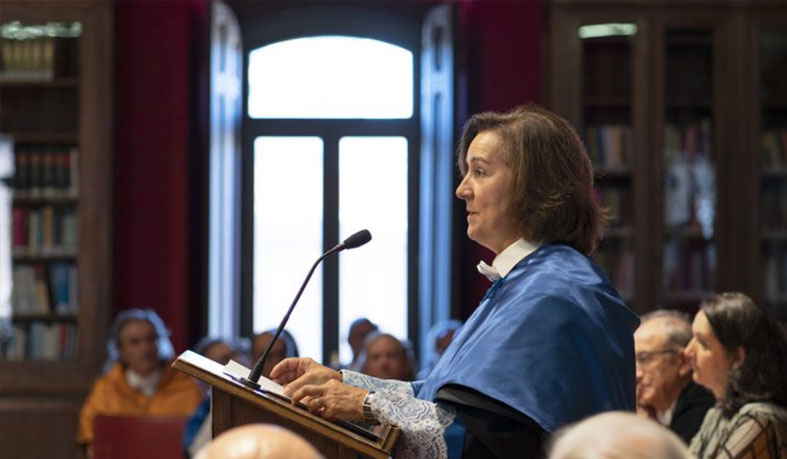
Launch of the autonomous vehicle
FEM Expert and Nebrija University are combining cutting-edge engineering with other fields such as computer science, ethics, psychology and legal issues related to the essential homologation of the vehicle in this transversal project.
Mathematics and Physics in the digital age
Session that addressed the challenges and opportunities of mathematicians and physicists in the digital age, interdisciplinarity, innovation and technology, as well as the bachelor's degrees in Applied Mathematics and Applied Physics (and its double degree) launched by the Nebrija University's Higher Polytechnic School.
Investiture ceremony of Carlos López-Otín as doctor honoris causa
Nebrija University named biochemist Carlos López-Otín a doctor honoris causa last Friday, November 18, in a ceremony that took place in the Conference Hall of the Madrid-Princesa Campus, and had Cristina Garmendia, president of the Cotec Foundation, PhD in Biological Sciences and former Minister of Science and Innovation, as the sponsor.
Welcome Sessions for the 2022-2023 academic year
Nebrija University held Welcome Sessions aimed at new face-to-face bachelor's degree students for the 2022-2023 academic year.
The sessions took place on September 7, 8 and 9 and in them the students got to know the University, professors, departments, facilities and colleagues who will be part of their university life.




